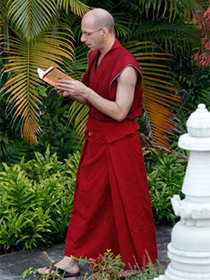- Home
- FPMT Homepage
Foundation for the Preservation of the Mahayana Tradition
The FPMT is an organization devoted to preserving and spreading Mahayana Buddhism worldwide by creating opportunities to listen, reflect, meditate, practice and actualize the unmistaken teachings of the Buddha and based on that experience spreading the Dharma to sentient beings. We provide integrated education through which people’s minds and hearts can be transformed into their highest potential for the benefit of others, inspired by an attitude of universal responsibility and service. We are committed to creating harmonious environments and helping all beings develop their full potential of infinite wisdom and compassion. Our organization is based on the Buddhist tradition of Lama Tsongkhapa of Tibet as taught to us by our founders Lama Thubten Yeshe and Lama Thubten Zopa Rinpoche.
- Willkommen
Die Stiftung zur Erhaltung der Mahayana Tradition (FPMT) ist eine Organisation, die sich weltweit für die Erhaltung und Verbreitung des Mahayana-Buddhismus einsetzt, indem sie Möglichkeiten schafft, den makellosen Lehren des Buddha zuzuhören, über sie zur reflektieren und zu meditieren und auf der Grundlage dieser Erfahrung das Dharma unter den Lebewesen zu verbreiten.
Wir bieten integrierte Schulungswege an, durch denen der Geist und das Herz der Menschen in ihr höchstes Potential verwandelt werden zum Wohl der anderen – inspiriert durch eine Haltung der universellen Verantwortung und dem Wunsch zu dienen. Wir haben uns verpflichtet, harmonische Umgebungen zu schaffen und allen Wesen zu helfen, ihr volles Potenzial unendlicher Weisheit und grenzenlosen Mitgefühls zu verwirklichen.
Unsere Organisation basiert auf der buddhistischen Tradition von Lama Tsongkhapa von Tibet, so wie sie uns von unseren Gründern Lama Thubten Yeshe und Lama Thubten Zopa Rinpoche gelehrt wird.
- Bienvenidos
La Fundación para la preservación de la tradición Mahayana (FPMT) es una organización que se dedica a preservar y difundir el budismo Mahayana en todo el mundo, creando oportunidades para escuchar, reflexionar, meditar, practicar y actualizar las enseñanzas inconfundibles de Buda y en base a esa experiencia difundir el Dharma a los seres.
Proporcionamos una educación integrada a través de la cual las mentes y los corazones de las personas se pueden transformar en su mayor potencial para el beneficio de los demás, inspirados por una actitud de responsabilidad y servicio universales. Estamos comprometidos a crear ambientes armoniosos y ayudar a todos los seres a desarrollar todo su potencial de infinita sabiduría y compasión.
Nuestra organización se basa en la tradición budista de Lama Tsongkhapa del Tíbet como nos lo enseñaron nuestros fundadores Lama Thubten Yeshe y Lama Zopa Rinpoche.
A continuación puede ver una lista de los centros y sus páginas web en su lengua preferida.
- Bienvenue
L’organisation de la FPMT a pour vocation la préservation et la diffusion du bouddhisme du mahayana dans le monde entier. Elle offre l’opportunité d’écouter, de réfléchir, de méditer, de pratiquer et de réaliser les enseignements excellents du Bouddha, pour ensuite transmettre le Dharma à tous les êtres. Nous proposons une formation intégrée grâce à laquelle le cœur et l’esprit de chacun peuvent accomplir leur potentiel le plus élevé pour le bien d’autrui, inspirés par le sens du service et une responsabilité universelle. Nous nous engageons à créer un environnement harmonieux et à aider tous les êtres à épanouir leur potentiel illimité de compassion et de sagesse. Notre organisation s’appuie sur la tradition guéloukpa de Lama Tsongkhapa du Tibet, telle qu’elle a été enseignée par nos fondateurs Lama Thoubtèn Yéshé et Lama Zopa Rinpoché.
Visitez le site de notre Editions Mahayana pour les traductions, conseils et nouvelles du Bureau international en français.
Voici une liste de centres et de leurs sites dans votre langue préférée
- Benvenuto
L’FPMT è un organizzazione il cui scopo è preservare e diffondere il Buddhismo Mahayana nel mondo, creando occasioni di ascolto, riflessione, meditazione e pratica dei perfetti insegnamenti del Buddha, al fine di attualizzare e diffondere il Dharma fra tutti gli esseri senzienti.
Offriamo un’educazione integrata, che può trasformare la mente e i cuori delle persone nel loro massimo potenziale, per il beneficio di tutti gli esseri, ispirati da un’attitudine di responsabilità universale e di servizio.
Il nostro obiettivo è quello di creare contesti armoniosi e aiutare tutti gli esseri a sviluppare in modo completo le proprie potenzialità di infinita saggezza e compassione.
La nostra organizzazione si basa sulla tradizione buddhista di Lama Tsongkhapa del Tibet, così come ci è stata insegnata dai nostri fondatori Lama Thubten Yeshe e Lama Zopa Rinpoche.
Di seguito potete trovare un elenco dei centri e dei loro siti nella lingua da voi prescelta.
- 欢迎 / 歡迎
简体中文
“护持大乘法脉基金会”( 英文简称:FPMT。全名:Foundation for the Preservation of the Mahayana Tradition) 是一个致力于护持和弘扬大乘佛法的国际佛教组织。我们提供听闻,思维,禅修,修行和实证佛陀无误教法的机会,以便让一切众生都能够享受佛法的指引和滋润。
我们全力创造和谐融洽的环境, 为人们提供解行并重的完整佛法教育,以便启发内在的环宇悲心及责任心,并开发内心所蕴藏的巨大潜能 — 无限的智慧与悲心 — 以便利益和服务一切有情。
FPMT的创办人是图腾耶喜喇嘛和喇嘛梭巴仁波切。我们所修习的是由两位上师所教导的,西藏喀巴大师的佛法传承。
繁體中文
護持大乘法脈基金會”( 英文簡稱:FPMT。全名:Found
ation for the Preservation of the Mahayana Tradition ) 是一個致力於護持和弘揚大乘佛法的國際佛教組織。我們提供聽聞, 思維,禪修,修行和實證佛陀無誤教法的機會,以便讓一切眾生都能 夠享受佛法的指引和滋潤。 我們全力創造和諧融洽的環境,
為人們提供解行並重的完整佛法教育,以便啟發內在的環宇悲心及責 任心,並開發內心所蘊藏的巨大潛能 — 無限的智慧與悲心 – – 以便利益和服務一切有情。 FPMT的創辦人是圖騰耶喜喇嘛和喇嘛梭巴仁波切。
我們所修習的是由兩位上師所教導的,西藏喀巴大師的佛法傳承。 察看道场信息:
- FPMT Homepage
- News/Media
-
- Study & Practice
-
-
- About FPMT Education Services
- Latest News
- Programs
- New to Buddhism?
- Buddhist Mind Science: Activating Your Potential
- Heart Advice for Death and Dying
- Discovering Buddhism
- Living in the Path
- Exploring Buddhism
- FPMT Basic Program
- FPMT Masters Program
- FPMT In-Depth Meditation Training
- Maitripa College
- Lotsawa Rinchen Zangpo Translator Program
- Universal Education for Compassion & Wisdom
- Online Learning Center
-
- Prayers & Practice Materials
- Overview of Prayers & Practices
- Full Catalogue of Prayers & Practice Materials
- Explore Popular Topics
- Benefiting Animals
- Chenrezig Resources
- Death & Dying Resources
- Lama Chopa (Guru Puja)
- Lama Zopa Rinpoche: Compendium of Precious Instructions
- Lama Zopa Rinpoche: Life Practice Advice
- Lama Zopa Rinpoche Practice Series
- Lamrim Resources
- Mantras
- Prayer Book Updates
- Purification Practices
- Sutras
- Thought Transformation (Lojong)
- Audio Materials
- Dharma Dates - Tibetan Calendar
- Translation Services
- Publishing Services
- Ways to Offer Support
- Prayers & Practice Materials
-
- Teachings and Advice
- Find Teachings and Advice
- Lama Zopa Rinpoche Advice Page
- Lama Zopa Rinpoche: Compendium of Precious Instructions
- Lama Zopa Rinpoche Video Teachings
- ༧སྐྱབས་རྗེ་བཟོད་པ་རིན་པོ་ཆེ་མཆོག་ནས་སྩལ་བའི་བཀའ་སློབ་བརྙན་འཕྲིན།
- Podcasts
- Lama Yeshe Wisdom Archive
- Buddhism FAQ
- Dharma for Young People
- Resources on Holy Objects
- Teachings and Advice
-
-
*If a menu item has a submenu clicking once will expand the menu clicking twice will open the page.
-
-
- Centers
-
- Teachers
-
- Projects
-
-
-
-
*If a menu item has a submenu clicking once will expand the menu clicking twice will open the page.
-
-
- FPMT
-
-
-
-
-
Countless sentient beings have suffered by being harmed or killed for every grain of rice you eat. Think about the previous grain from which it came. If you understand this, there’s no way you’ll be able to eat simply for your own selfish enjoyment; you’ll always make offerings of your food and drink.
Lama Zopa Rinpoche
-
-
-
- Shop
-
-
-
The Foundation Store is FPMT’s online shop and features a vast selection of Buddhist study and practice materials written or recommended by our lineage gurus. These items include homestudy programs, prayers and practices in PDF or eBook format, materials for children, and other resources to support practitioners.
Items displayed in the shop are made available for Dharma practice and educational purposes, and never for the purpose of profiting from their sale. Please read FPMT Foundation Store Policy Regarding Dharma Items for more information.
-
-
FPMT Community: Stories & News
11
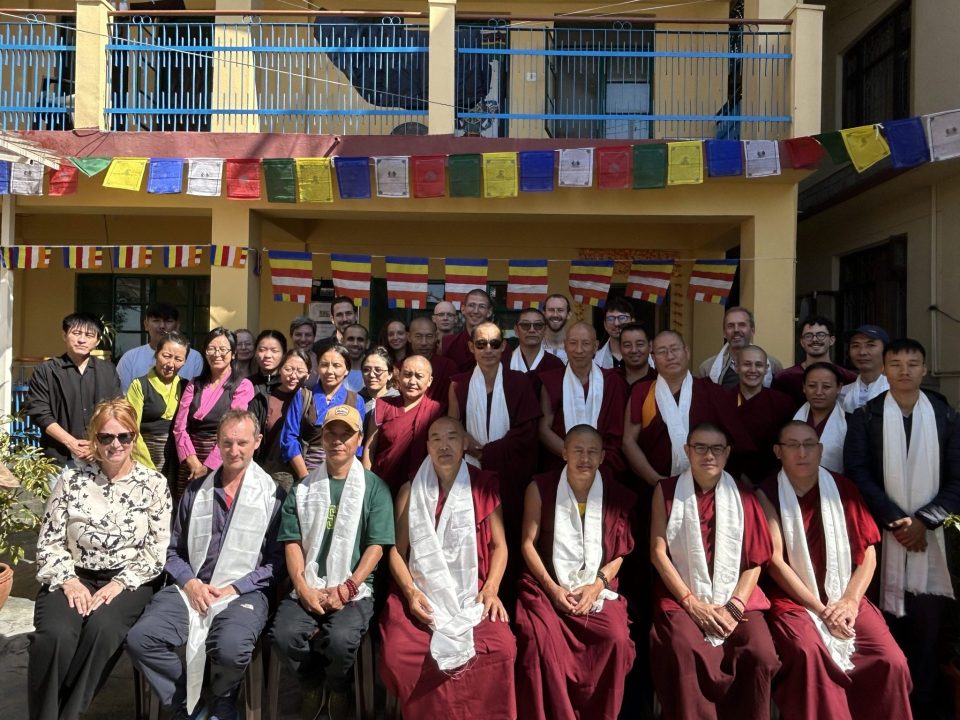
LRZTP welcomes new students.
Lotsawa Rinchen Zangpo Translator Program (LRZTP) is an FPMT project in Dharamsala, Himachal Pradesh, India. LRZTP has produced many gifted Dharma interpreters-translators for FPMT Dharma centers since its conception over twenty-three years ago. In addition to the two-year intensive training program, LRZTP also runs short Tibetan language courses and offers private online Tibetan language lessons.
We are happy to share a report on LRZTP’s successes and losses from the past year, including the passing of LRZTP teacher Geshe Tenzin Wandak in September, and starting the new interpreters training course, LRZTP 10, which has welcomed 18 new students from around the world, in October.
2025 has been an eventful year for Lotsawa Rinchen Zangpo Translation Program. First, there was the bittersweet moment of saying goodbye to the graduates of LRZTP 9, who in June received their certificates and are now continuing their studies in monasteries or training as interpreters in various places.
Then in September came an extremely sad and painful moment when we said our final farewell to Geshe Tenzin Wandak who passed away after his long illness. Geshe-la was a longtime teacher and the school’s main driving force as well as a very precious friend to everyone in LRZTP.
But a very happy occasion was welcoming a group of new students from all over the world who began their studies in the LRZTP 10 program in the second half of October. We are very happy to have eighteen devoted and highly motivated students joining the new two-year intensive course of Tibetan language. During the next two years they will study colloquial Tibetan, classical Buddhist texts and train in interpretation of Dharma teachings. This way the school continues its mission and follows the vision of Lama Zopa Rinpoche, who created the program in the late 1990s.
The students of LRZTP 10 come from: Mexico, Austria, United States, Canada, Israel, Brazil, France, Poland, Russia, Belgium, India, United Kingdom, Spain and Switzerland. The program currently has eighteen students and two who attend the first eight weeks of the course. The new program was inaugurated on October 17 and classes began on October 20.
As in previous years students attend 2.5 hour classes in the morning to study vocabulary and grammar of colloquial Tibetan on Mondays and Tuesdays, classical/literary Tibetan on Wednesdays and have drilling, listening and reading classes on Thursdays and Fridays. Four times a week in the afternoon they attend one-on-one conversation classes (two hours) with Tibetan native speakers, all trained professional teachers. Later in the program they will have lessons in Tibetan handwriting and in the second year will dive into studying Dharma texts in Tibetan and learn the interpretation techniques.
The LRZTP two-year course is famous for its effectiveness but also for its intensity. December is the month when the first major break is scheduled, so that everyone can come back to study with fresh minds in the latter part of January.
We wish all new students great success in this amazing adventure they have just begun! Additionally the school will soon announce a 2-month intensive language course for beginners. And as always we welcome anyone who wishes to have private classes with our highly qualified teachers at the school or online.
Grateful thanks to Lotsawa Rinchen Zangpo Translator Program for sharing this inspiring update. You can learn more about LRZTP by visiting their website.
We welcome the submission of news stories from those within the FPMT community. This can be a story about something you have personally completed or accomplished, about someone else who has done so, or about the FPMT center, project, or service of which you are a part. Ideal submissions will give readers reasons to rejoice, share ideas, and create connections between those in the international community. Have something to share? Please let us know!
Foundation for the Preservation of Mahayana Tradition (FPMT), is a Tibetan Buddhist organization dedicated to the transmission of the Mahayana Buddhist tradition and values worldwide through teaching, meditation and community service.
21
Please Enjoy Our November E-news
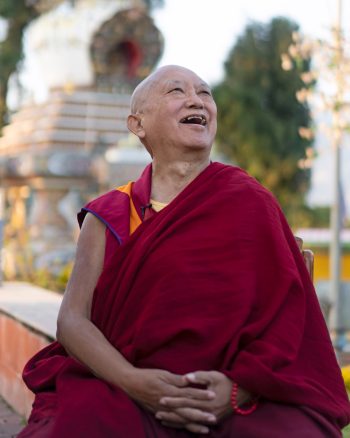
Lama Zopa Rinpoche in the stupa garden at Kopan Monastery, November 2021. Photo by Ven. Roger Kunsang.
Our November 2025 e-News is now available and brings many causes for rejoicing including:
- Progress on the Stupa of Complete Victory
- Teachings and advice from Lama Yeshe and Lama Zopa Rinpoche
- A generous offer for FPMT centers from the Lama Yeshe Wisdom Archive
- Grants offered for education and preservation of the Gelugpa tradition
- Powerful pujas and prayers offered on Lhabab Duchen
- Resources and opportunities for study and practice
- Causes for rejoicing from around the world
- Opportunities to offer service in the FPMT organization
and much more!
Please read this month’s e-news in its entirety.
Have the e-News translated into your native language by using our convenient translation facility located on the right-hand side of the page.
Visit our subscribe page to receive the FPMT International Office News directly in your email inbox.
- Tagged: fpmt enews
6
Ven. Roger Kunsang Visits FPMT Mongolia

Ven. Roger visiting the soup kitchen during preparations. Photo courtesy of FPMT Mongolia.
Lama Zopa Rinpoche visited Mongolia for the first time in 1999 at the invitation of Bakula Rinpoche, who had already been working for 10 years to reestablish Buddhism in the country, and a small group of Mongolians. It was explained to Rinpoche how important it was for high lamas to come to Mongolia to teach and actively support the revival of the Buddhist heritage for future generations. Due to Lama Zopa Rinpoche’s wish to help, FPMT Mongolia became a registered Mongolian religious organization in 1999 and a few dedicated FPMT students moved to Ulaanbaatar to begin work. Since then, dozens of Westerners and hundreds of Mongolians have developed an organization that provides Dharma education, Universal Education, Sangha support, and social services for some of Mongolia’s most needy.
Director of FPMT Mongolia, Susan Roe, overviewed Chief Executive Officer of FPMT Inc. Ven. Roger Kunsang’s recent visit to Mongolia this October. We share this report to inspire you to rejoice in the incredible activities happening in Mongolia for the benefit of so many!
The FPMT Mongolia team was happy and honored to host Ven. Roger’s recent visit in October in Ulaanbaatar. The week was very busy and full of many activities but the team rejoiced in having him return as there was much to discuss and share with him since his last visit in 2017.
Key activities included a warm welcome from monastic partners at Idgaa Choizinling Monastery who requested support from FPMT for various activities. They were appreciative of the continued support to the monks’ food program, and this also supports logistics for the annual Mani Retreat and other needs. (One of Lama Zopa Rinpoche’s Vast Visions for the FPMT organization is to establish 100 Million Mani Retreats (100,000 recitations of 100 million OM MANI PADME HUM) around the world and FPMT Mongolia has been hosting this annual retreat for thirteen years.)
Ven. Roger spent much time meeting and discussing with FPMT Mongolia staff and the FPMT Mongolia Board through both one-to-one meetings and by participating in regular administrative meetings such as the management meeting and specially organized board meeting to discuss more complex, pending issues and future directions for the center. He also visited Lamp of the Path and the Dolma Ling Nunnery property to observe ongoing and new community support programs and spent time inspecting improvements to the Mahayana Apartment Building while also considering future directions and alternatives related to ongoing management and continued development of these assets or resources. (Lamp of the Path, FPMT Mongolia’s flagship community service project, continues to serve as a vital support system for vulnerable populations in the Amgalan ger district of Ulaanbaatar. FPMT’s Social Services Fund has been substantially supporting Lamp of the Path since 2012 to date, most years covering the entire budget, in recognition of their incredible life saving work.)

Ven. Roger with the Mahayana Children’s Program, Mongolia. Photo courtesy of FPMT Mongolia. Photo courtesy of FPMT Mongolia.

Ven. Roger visiting the progress of the Maitreya statue in Mongolia. Photo courtesy of FPMT Mongolia.
While in Mongolia Ven. Roger also helped to inaugurate the Fall session of the Mahayana Children’s Program and attended a book launch aimed at generating interest in a new 16 Guidelines resource which has been translated into Mongolian language in support of Universal Education. He was also able to meet with local donors and long-time FPMT Mongolia friends and enjoyed a day traveling outside of Ulaanbaatar to visit the new Maitreya statue which is currently under construction, to visit a newly established retreat center being operated by Buddhist friends, and to enjoy a traditional Mongolian lunchtime feast at one of Mongolia’s most famous ger camps with selected members of the team.
The entire FPMT Mongolia team was thrilled and felt equally blessed to have Ven. Roger’s extensive support and guidance throughout his short visit; his continued advice and recommendations related to the further development of the spiritual program and the importance of continuing our work on secular education was also greatly appreciated. And of course, everyone was very interested in and happy to hear his many stories of shared adventures, informal or unexpected teachings and unique experiences with both Lama Yeshe and Kyabje Lama Zopa Rinpoche based on his long service and deep devotion to our guiding teachers. It is hoped that Ven. Roger will find time to come again to Mongolia and continue to provide his wisdom, insight and encouragement to the team and our continuing efforts and that his next visit will happen before too much time passes us all by again!
You can learn more about all of the exciting beneficial activity happening through FPMT Mongolia’s compassionate effort.
With grateful thanks to Susan Roe for this report. We welcome the submission of news stories from those within the FPMT community. This can be a story about something you have personally completed or accomplished, about someone else who has done so, or about the FPMT center, project, or service of which you are a part. Ideal submissions will give readers reasons to rejoice, share ideas, and create connections between those in the international community. Have something to share? Please let us know!
Foundation for the Preservation of Mahayana Tradition (FPMT), is a Tibetan Buddhist organization dedicated to the transmission of the Mahayana Buddhist tradition and values worldwide through teaching, meditation and community service.
- Tagged: fpmt mongolia, lamp of the path, mongolia
31
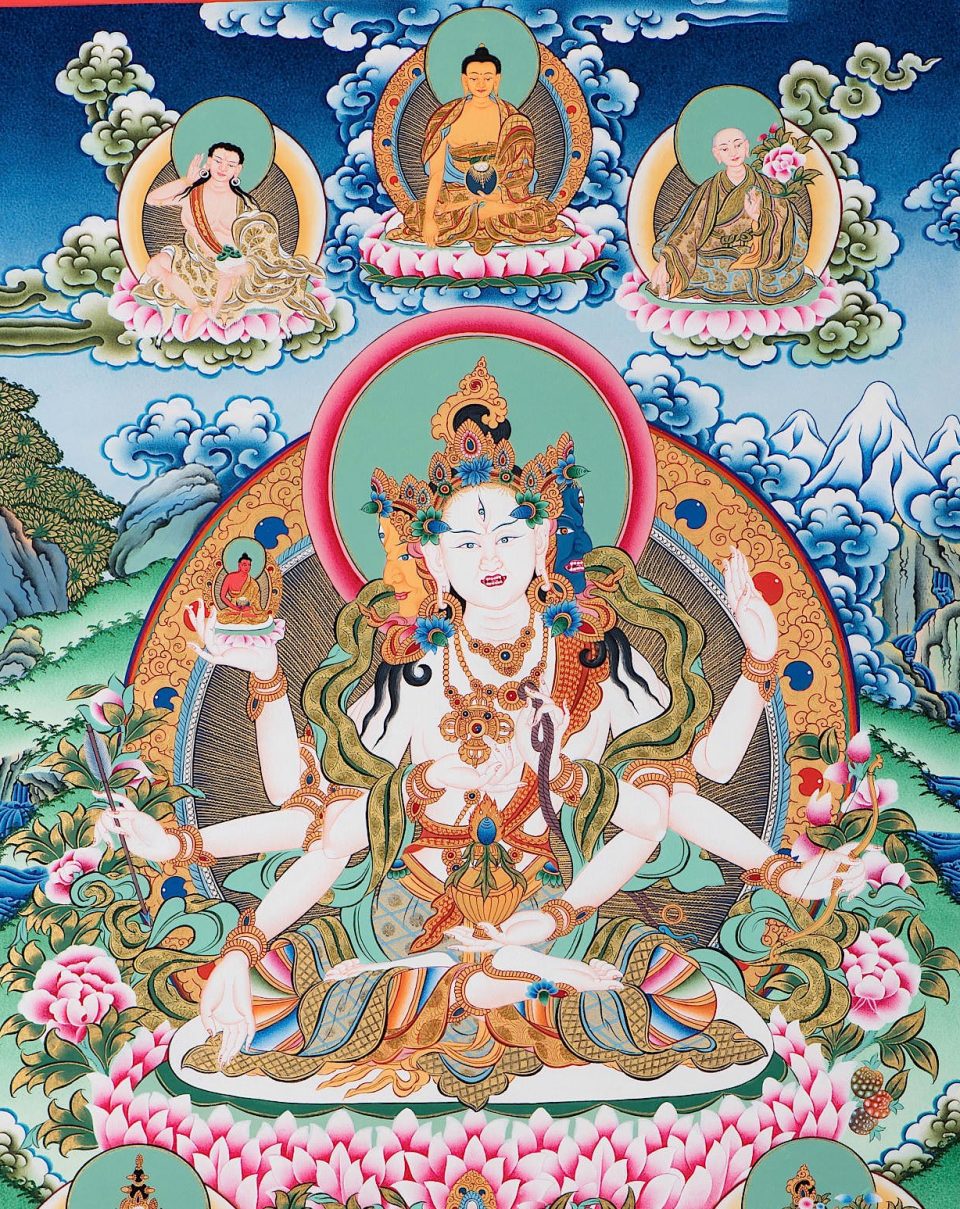
Namgyalma
By Ven. Tenzin Tsomo
Land of Medicine Buddha (LMB) in Soquel, California, completed its tenth annual Namgyalma Retreat in October 2025, once again fulfilling the holy wishes of Kyabje Zopa Rinpoche to make it a yearly event.
The initial impetus for the practice was sparked by the incredible kindness of Kyabje Khenzur Jhado Chogtrul Rinpoche. Ven. Steve Carlier, LMB’s resident teacher who regularly leads the retreat, shares this account:
“When Kyabje Jhado Rinpoche returned to Sacramento in 2013, we invited him to teach at LMB, and accordingly, we sought his advice on the program. To our surprise, Rinpoche said it was his belief that Kyabje Zopa Rinpoche had named the center “Land of Medicine Buddha” because he hoped it would become a place for the study and practice of kriya tantra. Jhado Rinpoche added that he knew of a Namgyalma sadhana by Panchen Lozang Chokyi Gyaltsen that was pure kriya tantra, along the lines of Je Tsongkhapa’s writings on that subject. He thought it would be really good, therefore, if he were to teach that to us. He came the following year, conferred the Namgyalma initiation, and after his teachings, set us up in retreat while he went off to teach elsewhere, before coming back at the end of our retreat to conduct the compensating fire puja.
“Kyabje Zopa Rinpoche got to hear about all this, and at the 2015 retreat in Guadalajara, Mexico, he told me that we should hold a Namgyalma retreat at LMB each year, to allow anyone who wanted to purify and cure illness, especially such illnesses as cancer, to recite 1,000 of the long mantra. Rinpoche also mentioned that it would be really amazing if someone could do a 100,000 Namgyalma long-mantra retreat for all the doctors and hospitals in the world to be able to cure all illnesses, and to immediately find cures for new illnesses as they emerge.”

Ocean blessing with blessed Namgyalma mantra water in the first retreat in 2016.
In accordance with Kyabje Zopa Rinpoche’s wishes, since 2016, LMB has been hosting an annual Namgyalma retreat for the purpose that Rinpoche outlined. We also made it a point to dedicate our practice to the long lives of His Holiness the Dalai Lama, Kyabje Zopa Rinpoche, and Kyabje Jhado Rinpoche, until Lama Zopa Rinpoche’s sad and sudden departure in 2023 behooved us to dedicate for his swift return instead.
At the end of our second retreat in 2017, when we offered our accumulated recitations of 10,276 mantras to Kyabje Zopa Rinpoche, he had replied with this heartwarming message:
Dear Tsomo and all the kind retreaters,
Billion zillion times I thank all of you, from the heart to all of you who did the retreat. So much power when you recite for others and yourself; it has so much power, so much power. Even what expert doctors can’t cure, you can, if done 1,000 or more. Bless the cream by blowing on it after each time you recite the mantra; you can do that—becomes powerful healing method. And besides, that becomes incredible purification and accumulation of merit!
With much and prayers to all of you… big appreciation!
Lama Zopa
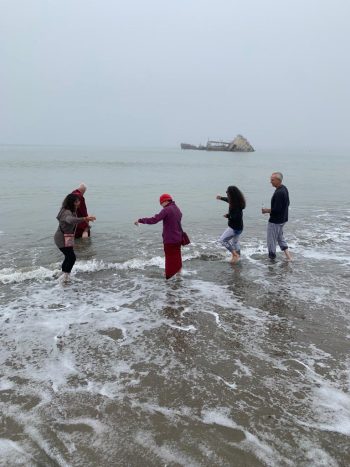
Ocean blessing with blessed Namgyalma mantra water in the eighth retreat in 2023.
When the Covid pandemic broke out in 2020, it did not disrupt our plans; we simply shifted the retreat online. This, in fact, turned out to be a boon. The medium offered both the benefits of a personal, solitary retreat and those of a group retreat. For example, according to the teachings on karma, each participant gets the merit of all the recitations accumulated by the group. The virtual format also made the retreat globally accessible. Hence, since Covid, the retreat has been offered online annually, reaching a wider community with students joining from across the United States and from such countries as Canada, Puerto Rico, India, New Zealand, Sweden, and Singapore.
We are especially happy to have accumulated 101,091 Namgyalma long mantras in the last ten years as this is the number that Kyabje Zopa Rinpoche had expressed would be beneficial. The total includes the mantras accumulated during the annual retreats as well as those recited during continued practice in between those retreats, organized by retreaters who wanted to keep the practice going throughout the year, particularly in earlier times, to dedicate the merits toward Kyabje Zopa Rinpoche’s good health and long life.
Ven. Steve informed us that after receiving the news of us finishing our tenth retreat, Kyabje Jhado Rinpoche sent us this encouraging message: “It’s fantastic that you’ve been able to do this retreat every year for ten years. You’ll find you become more experienced as the years go by. And you’ll get better and better. I rejoice.”
Of the sixty-nine individuals who have participated in the retreat since 2016, two have done the retreat all ten years; one did seven; ten did at least three each, and there were three returning retreatants in the last five years. Participants expressed gratitude for the practice and found joy in it. We usually parted after each session with big smiles all around, with appreciation for the group energy from practicing together.
Trish Crout, who had completed five Namgyalma retreats, shared:
“My introduction to Vajrayana Buddhism was my first Namgyalma retreat five years ago. I had absolutely no idea what I signed up for; I just knew I had to do it. Sometime during that retreat, I was overwhelmed with the beauty of the practice and the all-encompassing love of the deity Namgyalma. Tears flooded my eyes uncontrollably. I cried out of sheer joy for finally finding my spiritual path, my home, my yidam; I had never experienced such beauty, such bodhicitta, such love, and I longed for all beings to have this experience.
“Ven. Steve has led this amazing, transformative retreat for ten years in a row now! His joyous effort and ease had me feeling comfortable right from the beginning. Slowly, slowly, I’ve become more fluent in the practice, and finally, in my fifth retreat this year, I reached 1,000 Namgyalma long-mantra recitations. It’s amazing! May the causes and conditions arise so that I may be fortunate to continue practicing Namgyalma until I become an enlightened being for the benefit of all.”
Land of Medicine Buddha does a monthly online practice of Panchen Chokyi Gyaltsen’s Namgyalma practice with the pure kriya tantra elements as taught by Kyabje Jhado Rinpoche; and will continue doing the annual 1,000 Namgyalma long-mantra retreat that Kyabje Zopa Rinpoche advised.
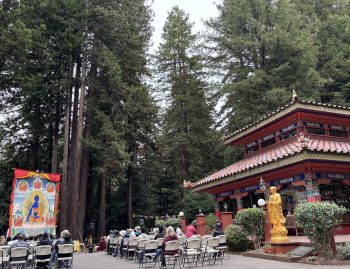
The 24-foot Medicine Buddha thangka raised for the annual Medicine Buddha Festival.
Written by Ven. Tenzin Tsomo, edited by Doris Low, Oct 2025.
We also rejoice that LMB recently celebrated their 19th Medicine Buddha Festival with the raising of a 24-foot Medicine Buddha thangka and community event including the Medicine Buddha puja, a talk on Medicine Buddha and guided meditation, and the opening of their new food cart, The Big Love Cafe. One of Lama Zopa Rinpoche’s Vast Visions for the FPMT organization is for centers to display these large thangkas as a way to receive imprints for enlightenment for all who see them.
We welcome the submission of news stories from those within the FPMT community. This can be a story about something you have personally completed or accomplished, about someone else who has done so, or about the FPMT center, project, or service of which you are a part. Ideal submissions will give readers reasons to rejoice, share ideas, and create connections between those in the international community. Have something to share? Please let us know!
Please explore the materials on Namgyalma and Medicine Buddha available to you.
Foundation for the Preservation of Mahayana Tradition (FPMT), is a Tibetan Buddhist organization dedicated to the transmission of the Mahayana Buddhist tradition and values worldwide through teaching, meditation and community service.
- Tagged: namgyalma, namgyalma mantra
29
Solitary Retreat as Practice and a Way of Life
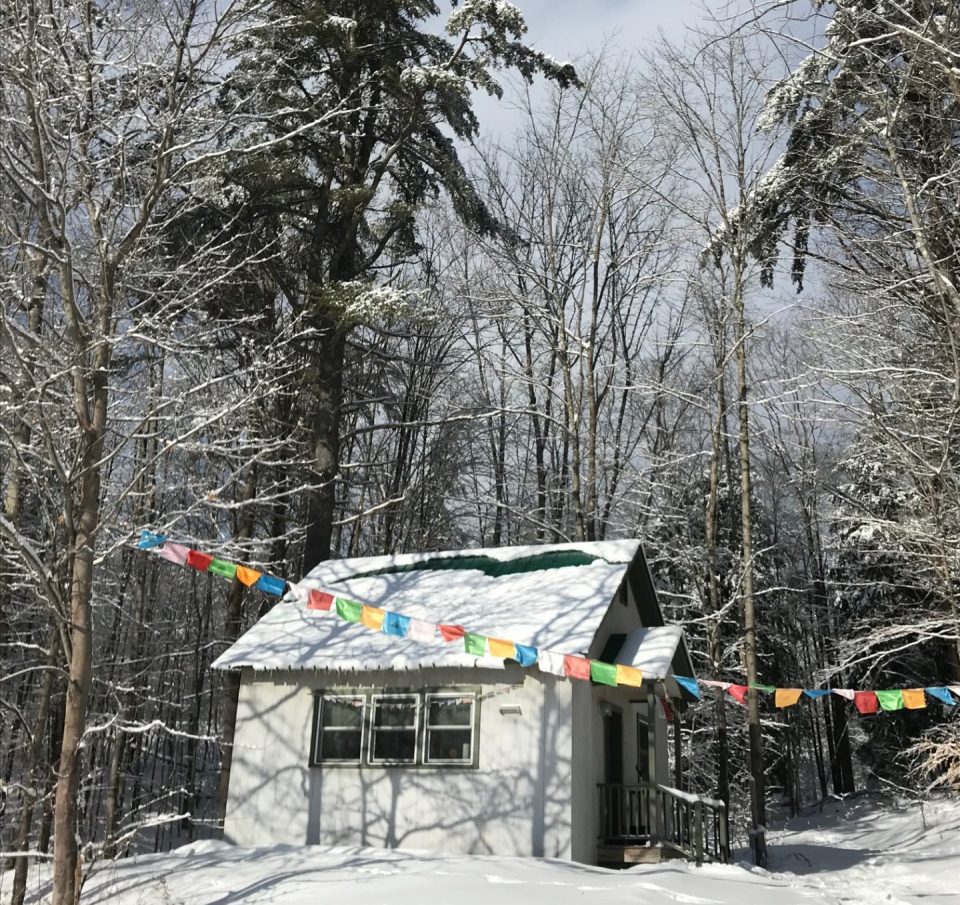
One of the retreat cabins at Milarepa Center in the snow.
Milarepa Center is an FPMT retreat center located in rural Barnet, Vermont, in the United States. The center is situated on 275 acres of serene Vermont beauty with a Stupa of Many of Doors, a set of 10 prayer wheels, and forest trails for walking/hiking. Director Dawn Holtz reflects on the importance of solitary retreat, the obstacles that may be keeping us from engaging in this practice, and offers encouragement for those considering solitary retreat as a way to progress on the path:
Lama Zopa Rinpoche explains in Heart Advice for Retreat, “Retreat helps draw your consciousness away from hallucination and into reality. It helps you discover your inner self. Only by recognizing the hallucinations that have been catching the mind and learning to distinguish between what is true and what is false is it possible to change our lives for the better. All such development of the mind comes from doing retreat. So retreat is the foundation of true development.”
Solitary retreat practice is so incredibly important for advancement on the path but how does one make it happen while living a life? Besides financial obstacles, most students have jobs, children, spouses, and all sorts of other things that may pose obstacles to engaging in the practice of solitary retreat. After 10+ years of supporting private solitary retreats here at Milarepa Center, as well as conducting many solitary retreats myself over the years, I have come to understand that the biggest obstacle is the mind. One simply needs to let go of romantic ideas of being in retreat for months or years at a time in some remote location and begin with making retreat a regular ongoing part of daily life.
Over the years, I have heard students comment that they are not able to set aside “enough time” for solitary retreat so they delay the practice. What is “enough time” and what exactly is the measure for this? Sadly, most will end up never engaging in retreat practice and/or when they are ready to try, they may have other obstacles from health issues due to aging, stress, overworking, unhealthy eating, etc. There seems to be a common belief among practitioners that retreat is not as valuable unless it is a “long-term” retreat and this is simply not true! A short weekend retreat done with proper motivation and commitment can yield realizations. There will always be obstacles and distractions, Western culture is designed that way, but if one starts building a private retreat practice from where they are, little by little a long-term practice is created.
Personally speaking, my service here at Milarepa Center for the last nine years had, (in my mind), been an obstacle to my ability to conduct long-term retreat until I shifted my thinking. I realized I simply needed to change my mindset and ideals about what retreat looks like. In the past few years, solitary retreat practice has grown to be the main aspect of my life and practice and in between retreat sessions I work to make the money I need, see friends/family, take care of personal things, etc. It took careful planning and time to get myself set up to live in this way and to get friends, family, and coworkers used to the idea of me not being readily available for stretches of time but it has all worked out and has been a continual process of learning and adjusting. There are also several people who come here to Milarepa Center regularly for private retreats and in between their retreats they take care of their life responsibilities.
Many religious traditions beyond Buddhism incorporate the practice of retreat and emphasize its importance in one’s spiritual practice and advancing on the path. Episcopal priest and teacher Margaret Guenther wrote in Holy Listening, “Retreat time helps in maintaining a healthy perspective. A retreat is not synonymous with a vacation; the former has an intentional austerity. The radically simplified environment discourages inner clutter. In most religious houses there is “nothing to do”—no games, no distractions, no loud noises, no TV, no busyness. Instead, there is silence, simple food, adequate space, and the security of being surrounded by a praying community.”
Financial challenges are another big obstacle for students who wish to conduct retreat. While Milarepa Center keeps retreats very affordable the reality is, here in the West, we do not have a culture that supports meditators in retreat. There are students who have been able and fortunate enough to find benefactors and that is wonderful but reliance on this can lead to difficult situations, obligatory strains on relationships, and not to mention having to leave retreat if the money stops coming in. Taking time in between retreat sessions to make money is a very real and reasonable way to support one’s own retreat practice as well as bringing the fruits of the practice off the cushion and into the world from time to time. Planting seeds in this way can begin to normalize regular retreat and create a culture of new yogis and yoginis here in the West supporting one another inside and outside of retreat by inspiring each other and showing others that it is possible to have a regular retreat practice rather than it being reserved for the chosen few with good connections. Supporting one’s own retreat also strengthens the commitment and relationship to a long term retreat practice and way of life and may even create the causes and conditions for a benefactor to manifest!
A collective individuation process is taking place and metaphorically speaking, Milarepa Center has become a hive for the activities of many individual bees doing their part to feed the whole. As each of us are individual cells within the larger body of humanity, we can choose to feed the whole with love or with sickness. With light or with darkness. With Buddha-nature or with ego. The only way to be liberated from suffering is to suffer. To sit with it, know it, feel it,. The only way through it, is through it. Having a safe and sacred container to do this work is crucial and Milarepa Center is a container for this. We are here, making sweet Buddha-nature honey one retreat at a time!
Milarepa Center, located in rural Vermont, offers reasonably priced space and support to students who wish to conduct solitary retreat (application and approval process required). The center offers fully equipped private cabins, grocery deliveries, access to the library and gompa, and ongoing support as needed during your retreat. A retreat scholarship fund is available by application for those with financial obstacles. Please learn more about retreat at Milarepa Center and also explore other FPMT retreat centers which may be located near you!
Dawn Holtz has served Milarepa Center in various capacities since 2012. She returned as Center Director in 2017 with the blessings and guidance of Lama Zopa Rinpoche to focus on creating a space for students to conduct solitary retreats. Dawn engages in solitary retreat practice regularly and regularly offers assistance to those who wish to begin a retreat practice. Dawn has a background in Renewable Energies & Sustainable Business Management as well as a Professional in Human Resources Certification from the Human Resource Certification Institute. While also serving as the Director of Milarepa Center, Dawn works as a Consulting HR Business Partner for a variety of businesses and is continuing to expand her studies through a Jungian Psychology & Spiritual Direction certification program.
For Further Exploring
Lama Zopa Rinpoche: The Importance of Retreat
Please enjoy an interview on the importance of retreat with Paula Chichester from the “How to Train a Happy Mind” podcast with Scott Snibbe. Paula Chichester spent five years and six winters at Milarepa Center preparing for and completing a deep four-year solitary retreat in our forest, without electricity or running water.
The Challenges and Joys of Retreat: Stepping Away from this Busy World with Paula Chichester was hosted online by Tse Chen Ling Center for Tibetan Buddhist Studies, June 2025.
Foundation for the Preservation of Mahayana Tradition (FPMT), is a Tibetan Buddhist organization dedicated to the transmission of the Mahayana Buddhist tradition and values worldwide through teaching, meditation and community service.
- Tagged: milarepa center, retreat, solitary retreat
27
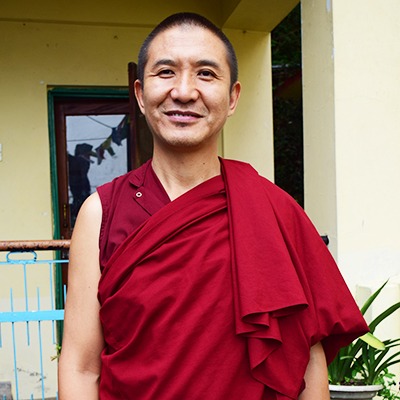
Geshe Tenzin Wangdak at LRZTP, 2015.
Geshe Tenzin Wangdak passed away from cancer on September 8, 2025 in Dharamshala, India.
Lotsawa Rinchen Zangpo Translator Program (LRZTP)’s dear teacher, Geshe Tenzin Wangdak touched the hearts of so many students and all who knew him. Dr. Filip Majkowski, Heidi Minx, and Julia Wilson shared a moving obituary and testament to Geshe-la’s many wonderful qualities:
It is with deep sadness that we share news of the passing of LRZTP’s beloved teacher Geshe Tenzin Wangdak (1972-2025) after a long and courageous battle with cancer. Geshe-la left this life on September 8, 2025 surrounded by friends and students while being cared for in Delek Hospital Dharamshala. His friendly guidance will be sorely missed by all of us at LRZTP and all others who were close to him.
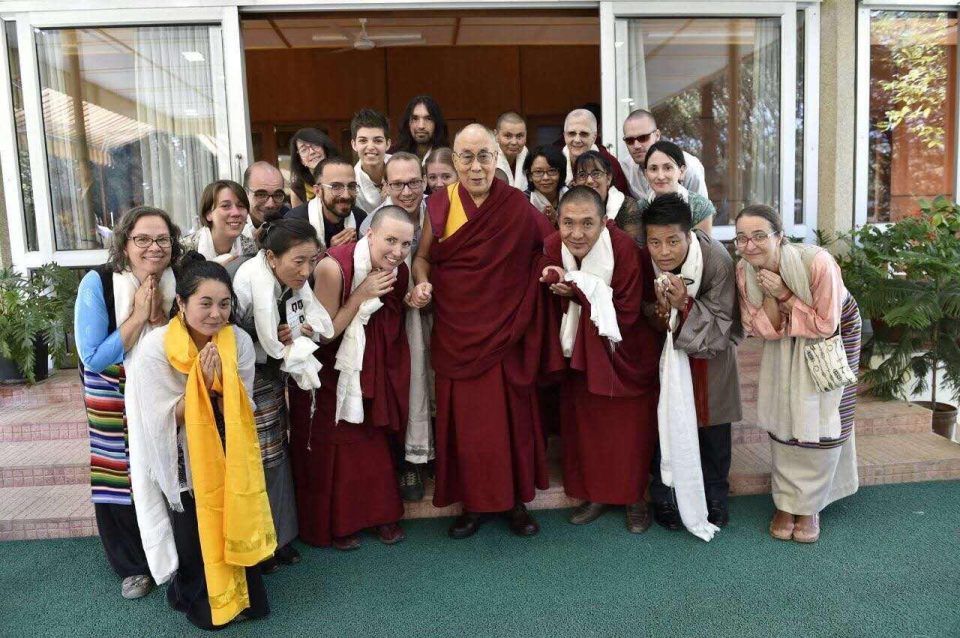
LRZTP 7 cohort audience with His Holiness the Dalai Lama, 2017 (Geshe Tenzin Wangdak is just right of HHDL).
Geshe Wangdak joined LRZTP in 2013 and eventually became one of the main Tibetan language and dharma teachers at LRZTP. Over the years he tirelessly worked creating new materials and updating the content and structure of the LRZTP two-year program of studies. His main concern was creating a friendly and learning-conducive environment for non-Tibetans to quickly learn colloquial Tibetan language and essential Dharma terminology, and in this he made himself ever available to eager students – even his lunch breaks would somehow morph into an impromptu Tibetan language lesson.
In more recent years he was heavily involved with refurbishing the school after the Covid pandemic and managing the two-year intensive program. During the last year and even up to the final month of his life he still remained involved with school through offering regular guidance to the program coordinator and helping appoint other geshe teachers to fill his positions.
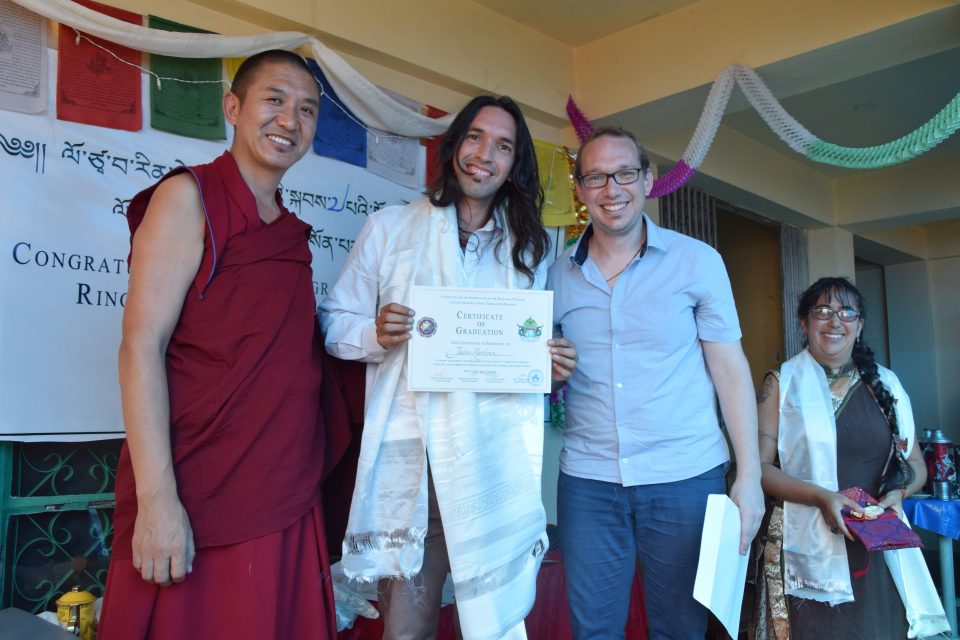
Geshe Wangdak in 2017 with Jairo, Yaron, and Martha during the LRZTP 7 graduation ceremony.
We would also like to share a couple memories of Geshe-la from Dr Filip Majkowski (a colleague from LRZTP) and from Heidi Minx (one of Geshe Wangdak’s early English language teachers and longtime friend).
Memories of Geshe Wangdak from Dr Filip Majkowski
I have known Geshe Tenzin Wangdak since 2017, when I first started working at LRZTP. From day one Geshe-la was very helpful and open minded about everything. He was always ready to reach out and help, he always had ideas and was a problems solver. He did everything with compassion and humor. By then he had already devoted so much of his time to LRZTP and the students. He had passion for his work and a big heart to all students. Much later, during the pandemic, he put the same heart and passion into teaching Tibetan online. He taught until his declining health allowed him to continue. In that he was a true inspiration to teachers and students alike.
The period of his sickness was a very sad time for LRZTP and everyone who knew him. After several months of fighting the disease in 2022 he was healthy again and it seemed he was winning. Then, in early 2024 suddenly things got worse. It was really sad to watch him lose energy and not be able to do what he loved. He could not teach, nor was he able to do house repairs, which was also his passion – in LRZTP he always had his kit with drills, hammers, screwdrivers etc. He loved that. But he still loved meeting people and give advice as much as possible.
I saw him last at the end of June, before I left for Europe. When he passed, I was back in Dharamsala, quite nearby, but unfortunately not able to see him. I regret that. I feel blessed I had this wonderful opportunity to meet Geshe-la in my life. I know we will meet again in some other life. Until then, may the blessings of all Buddhas and Bodhisattvas be with you, Geshe-la. We miss you.
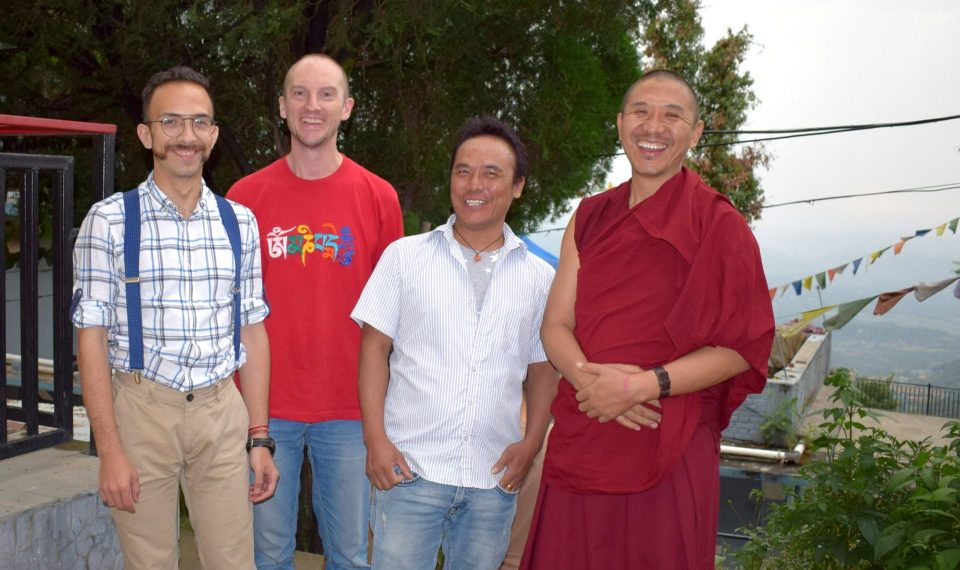
Geshe Wangdak (far right) in 2018 with (from left) Alex, Filip and Thupten of LRZTP.
Memories of Geshe Wangdak from Heidi Minx
In 2009, a program was started by the Dalai Lama Trust for a select group of geshes – a foreign language program so that when His Holiness’s office received requests for Dharma teachers, students from this group could teach in either English or Chinese. Geshe Wangdak was one of two students in the advanced English class. Geshe-la understood the nuances of learning – that it wasn’t just a written exercise based on books, but also discovering and experiencing cultural nuances. The abundance, or lack of direct translations of many words would lead us to interesting debates. The Tibetan word for weasel, neuli, led us to the western scientific naming system for rodents, and then into evolution, back to dinosaurs. Gently debating became a regular theme – and I remember his earnest surprise that there were not “single words” in English for words used commonly in debate — “the book is on the table, so the table supports the book, and the book supports the table – what is the single word for each of these items?” Our classes weaved through traditional vocabulary and writing to the methods of how to teach western students.
One assignment centered on teaching the Four Noble Truths; and as they began to teach, I asked, “What is karma?” Geshe-la’s face lit up, first in confusion that his English teacher didn’t know what karma was, to then a look of disbelief that a concept so deeply understood in his studies and culture might need to be explained more deeply. He grasped that moment – and I believe it is just one example of what made him an excellent teacher, the wisdom to understand that even the smallest concepts needed to be taught and explained with the same importance as deeper concepts. We discussed the differences and similarities between Buddhism as a science, philosophy and religion and how that intersected with western science, philosophy and religion.
Geshe Wangdak was a deeply committed friend as well. His dedication to our friendship was evidenced in so many ways – whether waking up early to stand in line at Yeshe Dhondup’s office when I was sick to make sure I got an early appointment so I could return to class quickly — making sure I had a seat saved with him at His Holiness’s teachings, bringing me to his aunt and uncle’s for huge family meals, seeing me happy after feeding puppies at lunch then coming to love and care for dogs for many years. He loved being a teacher, and in our free time after classes took it upon himself to begin to teach me Tibetan — buying children’s primer books and getting me my first fountain pen that he cut the tip off of for best letter structure. He said, “You will learn letters first, like I did.” Several years later Geshe-la and I worked together on a program to teach the students of a local Thangka school (ITTA) English with the intention that they be able to talk about and share their art with others outside the Tibetan community. Geshe-la was an excellent friend. When my cat died, when I lost my job, when it was my “obstacle year” – Geshe-la would say prayers, and have his khangtsen say prayers. His smile and sense of humor made him an excellent friend and teacher as well. The day his class graduated the teacher translation program at IBD, we had a private audience with His Holiness. At the end of the audience, we all walked out to the steps for the celebratory photo with His Holiness. His Holiness was looking at my tattoos and talking with me as we were walking. As we got to the steps, His Holiness noticed the sengye tattoos on my arm, he clasped my arm and began clapping his hand against it laughing, “yah bobdhuk!” The students all looked up a bit in shock. As we walked slowly to Dharamkot for a pizza party, Geshe-la said, “We thought you were getting scolded – but how do you say? You got beat up by the Dalai Lama, very good blessing!” making us both laugh more as I explained the nuance of the phrase “beat up.”
Geshe-la truly embodied the intent of His Holiness’s program, going on to support Julia with her interpreting at the Tibetan Library, and later with the LRZTP program teaching Tibetan language and Buddhism to western students, planting innumerable seeds of karma that will ripen and unfurl in all corners of the world for generations. In his last week, I witnessed the deep devotion of his students, calling and visiting – imparting to him the deep care that they have for him, as he had for them. His quick and bright smile, his nurturing and genuine care for others, his warm yet direct nature, his powerful yet gentle voice and his deep but unassuming knowledge will be deeply missed by so many who were lucky to have had the karma to know him in this lifetime.
With grateful thanks to Dr. Filip Majkowski, Heidi Minx, and Julia Wilson for this moving tribute.
Please pray that Geshe Wangdak may never ever be reborn in the lower realms, may he be immediately born in a pure land where he can be enlightened or to receive a perfect human body, meet the Mahayana teachings and meet a perfectly qualified guru and by only pleasing the guru’s mind, achieve enlightenment as quickly as possible. More advice from Lama Zopa Rinpoche on death and dying is available, see Death and Dying: Practices and Resources (fpmt.org/death/).
To read more obituaries from the international FPMT mandala, and to find information on submission guidelines, please visit our new Obituaries page (fpmt.org/media/obituaries/).
- Tagged: obituaries, obituary
17
Our October Newsletter is Now Available
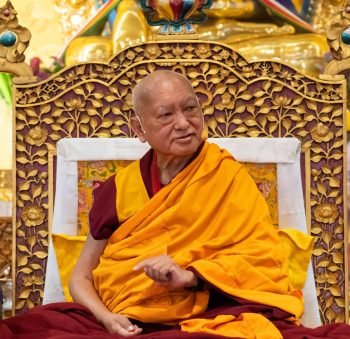
Lama Zopa Rinpoche teaching at the Kopan lamrim meditation course, Kopan Monastery, Nepal, December 9, 2022. Photo by Ven. Lobsang Sherab.
Our October e-Newsletter is now available and we are sharing news, resources, and causes for rejoicing including:
- Teachings from Lama Zopa Rinpoche and Lama Yeshe
- News about His Holiness the Dalai Lama
- Information about Lhabab Duchen approaching on November 11
- Grants offered to holy object projects
- News and stories from FPMT centers, projects, and services
- Resources and opportunities for study and practice
- Job opportunities in the FPMT organization
- A call for submissions
And much more!
Please read this month’s e-news in its entirety.
Have the e-News translated into your native language by using our convenient translation facility located on the right-hand side of the page.
Visit our subscribe page to receive the FPMT International Office News directly in your email inbox.
- Tagged: enews, fpmt enews
16
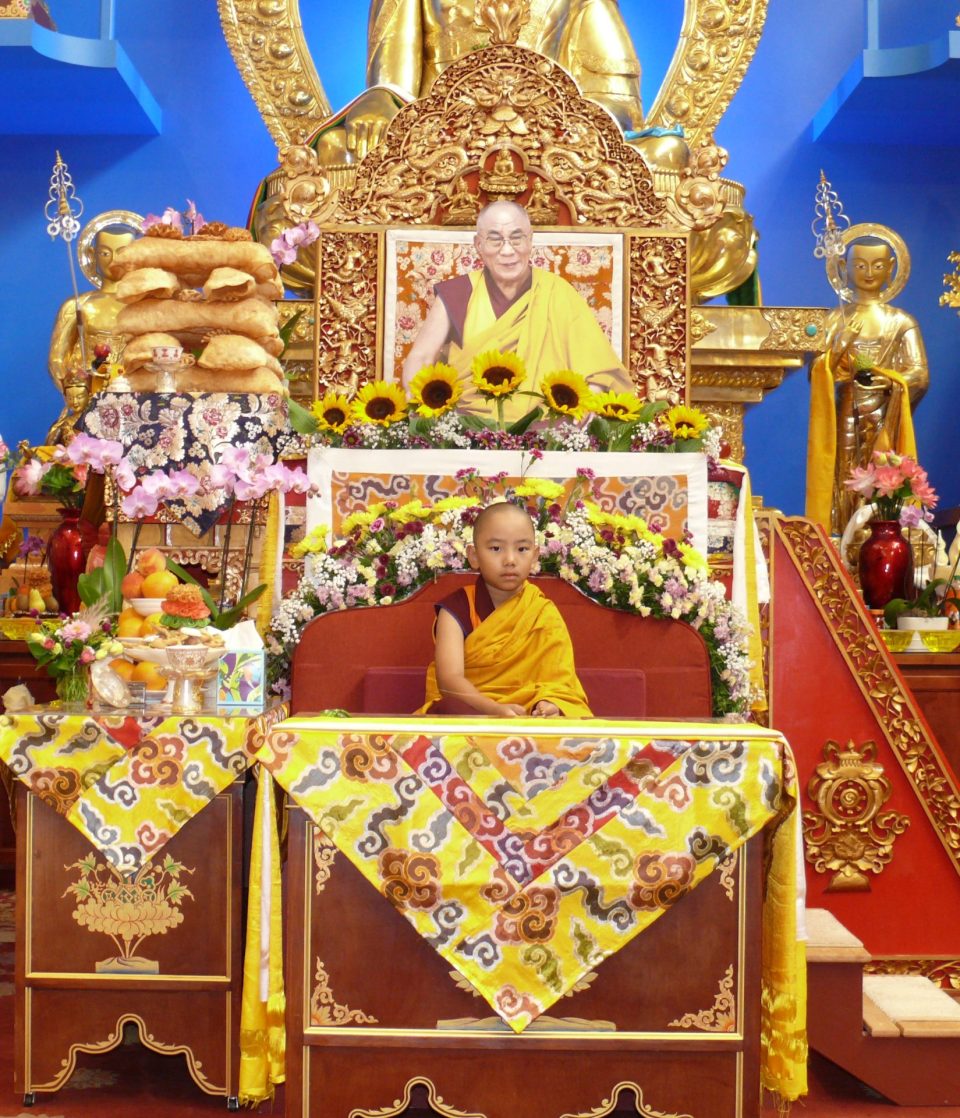
Tenzin Nawang Rinpoche on the occasion of his enthronement, Dear Park, Center, Oregon, WI, USA. Photo by Kalleen Mortensen.
By Namdrol Miranda Adams
In late September 2025, a historic event took place at Deer Park Buddhist Center in Oregon, Wisconsin: the enthronement of Tenzin Nawang Rinpoche, a seven-year-old boy recognized by His Holiness the Dalai Lama as the reincarnation of Geshe Lhundub Sopa. The occasion drew hundreds of attendees—monks, lay students, and members of the Tibetan and Western Buddhist communities—who gathered to honor the return of one of the most influential figures in the spread of Tibetan Buddhism to the United States.
Geshe Sopa’s Enduring Legacy
Geshe Lhundub Sopa (1923–2014) was among the first generation of Tibetan monastics to teach in the West after 1959. Having fled Tibet after the Chinese invasion, Geshe-la was invited to the University of Wisconsin at Madison, where he became the first Tibetan to receive tenure at an American university. Through decades of teaching, Geshe Sopa trained a generation of scholars, introducing Western students to the depth of Buddhist philosophy while founding Deer Park Buddhist Center as a locus of authentic study and practice near Madison.
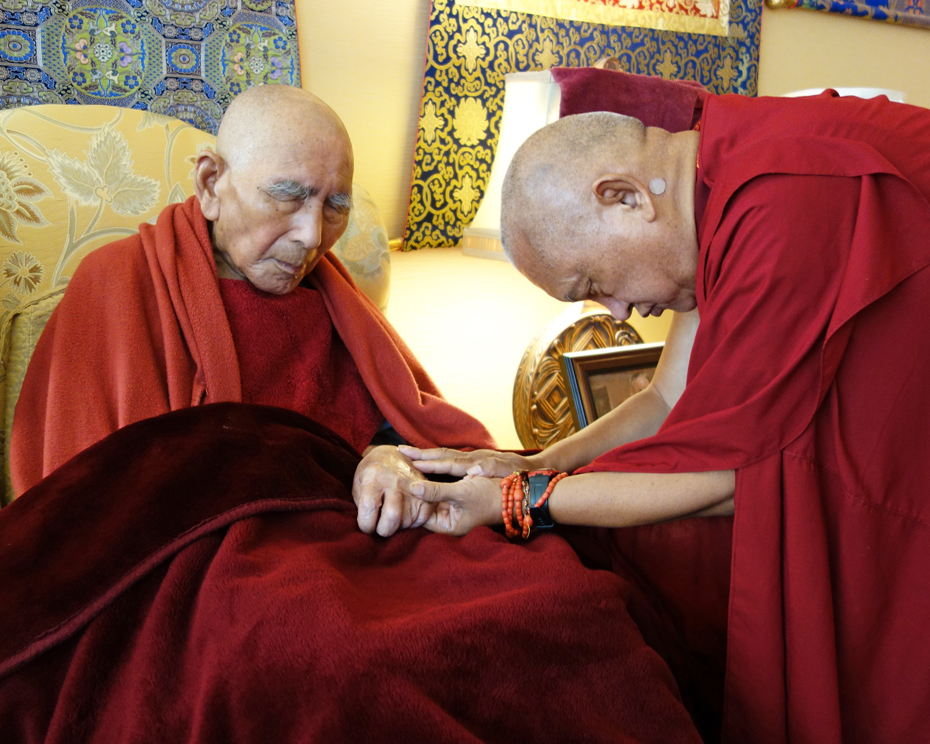
Lama Zopa Rinpoche doing prayers with Geshe Sopa Rinpoche a month before Geshe Sopa passed into clear light meditation, Deer Park Buddhist Center, Wisconsin, US, July 2014. Photo by Ven. Roger Kunsang.
Geshe Sopa’s legacy extends deeply into the global FPMT community. Besides training many of the most influential American Buddhist Studies scholars of the 20th Century, Geshe-la was an early teacher and mentor of Lama Zopa Rinpoche. Their relationship exemplifies the lineage continuity that FPMT upholds. For the FPMT mandala, the recognition of Geshe Sopa’s reincarnation carries not only historical but also spiritual significance: it represents the renewal of a karmic relationship foundational to the spread of Dharma in the modern world.
The Ceremony: Tradition in the Heartland
The enthronement ceremony, held at Deer Park, was presided over by senior monks and the Dalai Lama’s representative to North America, Namgyal Choedup.
For the local and Tibetan communities, the event symbolized both continuity and homecoming. Geshe Sopa had been instrumental in establishing Deer Park as one of the first monasteries and Buddhist centers in the United States, and the temple at Deer Park remains a sacred site for all.
The young tulku, Tenzin Nawang, lives with his family in Toronto. The ceremony combined ritual solemnity with moments of simple humanity, as the young Rinpoche sat among senior monks and community elders—at one point quietly turning a Rubik’s Cube in his hands with the same focus as others gave their prayers. This gentle contrast between childlike presence and the profound spiritual significance of this time embodies the living continuity of Tibetan Buddhism in a new cultural context, where ancient lineage and modern life meet with ease and authenticity.
A Global Gathering of Students
The enthronement drew a remarkable international assembly of students and disciples who had studied with Geshe Lhundub Sopa over the decades. Many traveled from across North America, Taiwan, Mexico, and beyond to Deer Park to honor their teacher’s reincarnation. Their presence reflected the global reach of Geshe Sopa’s influence and the deep respect his students continue to hold for his scholarship and compassion. For these practitioners, the recognition of Tenzin Nawang Rinpoche was not only a joyful reunion but also a living affirmation that lineage endures—not as an abstract idea, but as an ongoing transmission of wisdom from teacher to student, and now, across lifetimes.
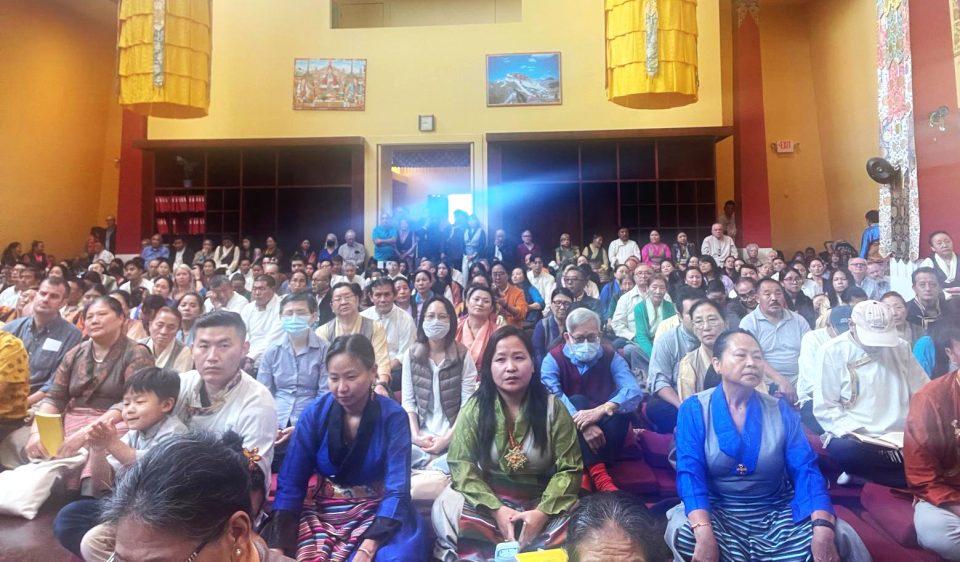
The Tibetan community was in “full strength” at the enthronement of Tenzin Nawang Rinpoche. Photo by Alfredo Pineiro.
The Tibetan community was also present in full strength, bringing with them the characteristic warmth, sweetness, and gentle humor that define their gatherings. The atmosphere, while reverent, was filled with laughter and ease—children moved freely among rows of elders, smiles were shared without reserve, and the flow of tea never ceased. This balance of devotion and lightheartedness created a space where sacred ceremony and ordinary human connection met naturally, embodying the heart of the Dharma in daily life.
Within all of this, the young Rinpoche held the throne, at times absorbed in the ceremony’s gravity and at others quietly turning his Rubik’s Cube.
As Namgyal Choedup, the Dalai Lama’s representative to North America, explained, the purpose of a reincarnation such as this is to continue the life and work of the previous master. The young Rinpoche’s path will blend traditional monastic study with modern education, preparing him to serve both Buddhist and secular communities in the years ahead. Plans were announced for Tenzin Nawang to travel to India soon to begin his formal training, marking the next step in the continuation of Geshe Sopa’s enduring legacy.
A Bridge Between Worlds
The enthronement also represented the unique integration of Tibetan Buddhist tradition within contemporary American society. Local officials from Dane County were present to extend greetings and recognize the event’s cultural importance—an acknowledgment of the decades of bridge-building initiated by Geshe Sopa himself in Wisconsin.
For the FPMT mandala, the enthronement of Tenzin Nawang Rinpoche is both a cause for rejoicing and a moment of reflection. Geshe Sopa’s connection with Lama Zopa Rinpoche situates this recognition within FPMT’s living lineage—a reminder of the intricate web of relationships that sustain the transmission of the Mahayana tradition.
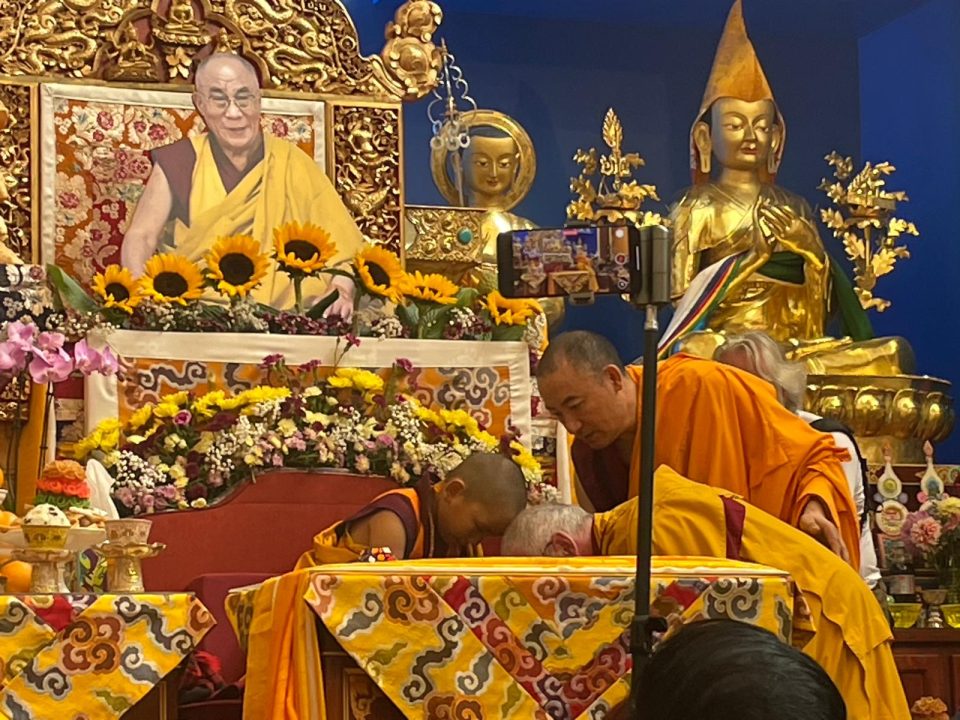
Ven. Roger Kunsang offering to Tenzin Nawang Rinpoche on behalf of the FPMT organization during the enthronement. Photo by Alfredo Pineiro.
FPMT’s CEO, Ven. Roger Kunsang, attended the ceremony on behalf of the organization, extending the mandala’s prayers and respect to the young tulku and his family. His presence symbolized the ongoing link between Deer Park, FPMT, and the wider international community that Lama Zopa Rinpoche helped to build.
During this event, it was evident and overwhelming to understand how Geshe Lhundub Sopa was, in every sense, a bridge—linking worlds, traditions, and hearts. Geshe-la bridged the vast distance between Tibetan monastic scholarship and Western academic inquiry, translating profound Dharma into forms that could be understood and lived by new generations. He bridged cultures, embodying humility and warmth that allowed Western students and Tibetan elders alike to meet in mutual respect. And he bridged eras—carrying the wisdom of pre-1959 Tibet into the modern world, ensuring that it could take root in places as unexpected as the American Midwest.
In his life and teaching, and now through his reincarnation, Geshe-la continues to show how compassion and understanding can span every divide.
As the final prayers concluded and the afternoon light filled the grounds, the moment seemed to embody a teaching I’ve heard often: that the Dharma flows where causes and conditions ripen, carried forward by the steady devotion and aspiration of those who practice it. From Tibet to India to the American Midwest, the stream of this lineage endures—alive, luminous, and present to guide generations yet to come.
Namdrol Miranda Adams is Dean and a Founder of Maitripa College, in Portland, Oregon. She teaches Buddhism, contemplative pedagogy, and engagement with faith and service at Maitripa. She practiced and studied as a Buddhist nun for seven years, and completed her doctoral work in Education at the University of Portland in 2021. She met Lama Zopa Rinpoche and Yangsi Rinpoche in 1998, and since then has dedicated herself to their projects. Namdrol has been Chair of the Board of the FPMT North America Regional Office since 2024.
Foundation for the Preservation of Mahayana Tradition (FPMT), is a Tibetan Buddhist organization dedicated to the transmission of the Mahayana Buddhist tradition and values worldwide through teaching, meditation and community service.
15
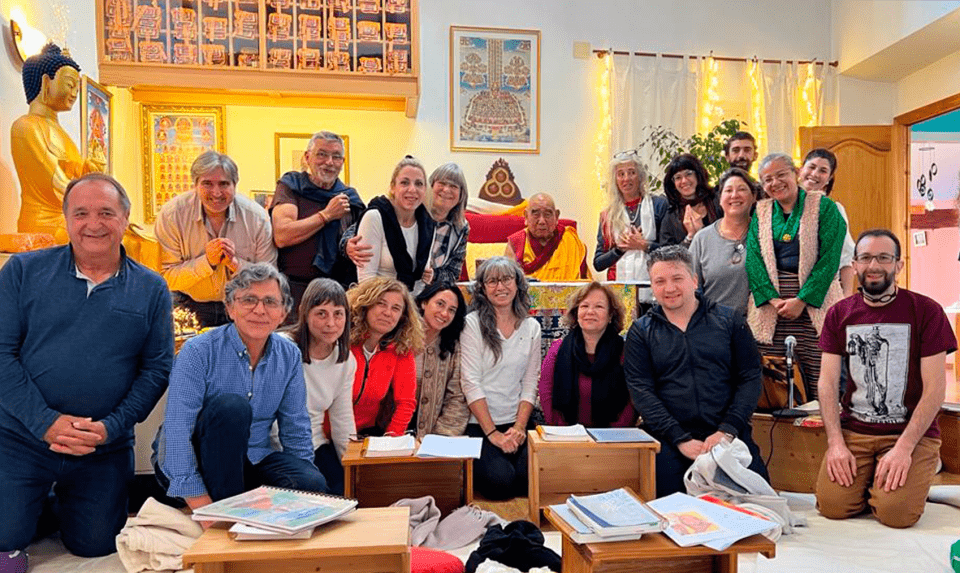
Geshe Lamsang after a teaching in Ontinyent’s old gompa, 2023. Photo courtesy of Tekchen Choeling.
How do you move a Buddhist Center? That is the question that the team at Tekchen Choeling Buddhist Center in Spain had to ask themselves last month, when they had to relocate the center’s holy objects to a new location. Assistant director, Kelsang Bas, tells the story!
How to Move a Dharma Center
By Kelsang Bas
As it turns out, you can’t just pick up the altar, put it in an Ikea box, and drive away.
Tekchen Choeling, aka The Land of the Mahayana Dharma, is a small yet robust FPMT center in Ontinyent, a town located in Eastern Spain between Valencia and Alicante. Like many small centers across the organization, we have been struggling with the challenges of an aging core team, lack of adaptation to the fast-paced digital environment, and difficulties to attract new people. However, there is something unique about Ontinyent’s center.
When Lama Zopa Rinpoche visited Madrid in 2018, Tekchen Choeling chartered a bus with almost fifty people—from a town of little over 30,000. We had rows reserved for them in the venue, and were welcomed with no shortage of hugs, cheers, and applause.
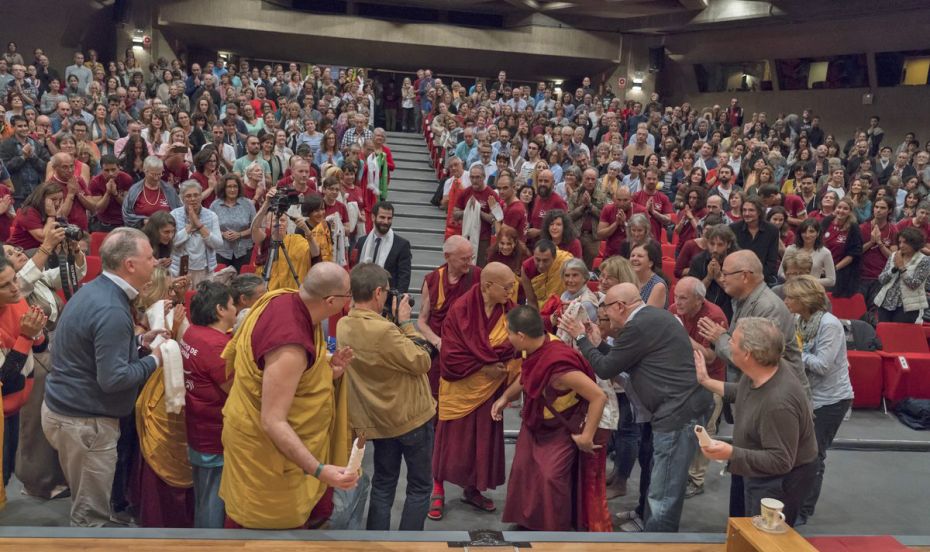
Lama Zopa Rinpoche greeted by students in Auditorio UGT, Madrid, Spain, October 2018. Photo by Ven. Lobsang Sherab.
Ontinyent is famous among Spanish FPMT centers for their devotion, perseverance, and tight-knit community. For example, the three founders who started the center as a study group back in 1986 are still among the most active members, acting now as director, SPC, and secretary. And there is something else that makes us special—we have also secured a generational change, with younger members taking on leadership roles and leading the center’s expansion and growth.
It is precisely that growth and expansion which led Tekchen Choeling to box up our gompa and move. In 2017, after experiencing a surge in attendance—barely fitting in our 70sqm apartment—we asked Lama Zopa Rinpoche for advice. Should we attempt to change locations?
Size wasn’t the only hindrance with our location. The tiny apartment was on a fourth floor with no elevator, and in a hidden and hard-to-access area of town with no easy parking. As the core team and many members grew older, the 4-story climb became a real obstacle. Some of the elder teachers also showed the aspect of having difficulties accessing the remote place. We wanted to move.
But Rinpoche cut our hopes sharp. It wasn’t the right time, he concluded after his investigations. “You must focus on creating a good harmony in the center,” he advised over and over. He also recommended the Sanghata Sutra as a practice for the center—a sutra with over 140 pages. “A thousand recitations,” Rinpoche instructed. By late 2022, we had finished the recitations and offered them to Rinpoche in Bodhgaya in January of 2023 and asked again. “Is it the right time to move?”
A couple of months later, shortly before showing the aspect of passing away, Rinpoche answered. The time couldn’t be better, according to his inquiry. With all of his blessings and words of encouragement, Tekchen Choeling could search for a new place for our center.
Fast-forward to September 2025. A dozen people wait standing in the small gompa—it just doesn’t look like a gompa anymore. The full lot of Kangyur texts are organized in fruit boxes—plastic boxes that can take more weight than cardboard. The walls depict no deities, no thangkas, no merit field, no images of beloved teachers—all of that waits wrapped and protected, to be transported, to the new location. And then Paloma Belda, the director, speaks with her sweet and tender voice, and everyone listens, solemnly. “The rest of the team are in the new venue, already reciting the Sutra of the Accumulation of Auspiciousness, ready to receive the Buddha and his entourage.”
Yes, that’s right. When you move a Buddhist center, you move the Buddha’s energy in it. When you move the holy objects, all buddhas and bodhisattvas come and watch. And if you are moving even the smallest statue, you are part of the buddhas’ entourage to the new location. Shivers. That’s what I felt when we heard the words of our director.
As with any procession, order matters. First, someone carrying incense. Any volunteers? Yes, you. Here, incense sticks and a lighter. Wait by the door. Second, the holy image of His Holiness the Dalai Lama. The privilege was granted to Marisol, an 18-year-old volunteer who had just arrived in Ontinyent to help for a couple of weeks. She was flabbergasted by the honor of her task, His Holiness’s portrait was bigger than her! Third, the images of Lama Yeshe and Lama Zopa Rinpoche. Fourth, the box with the altar objects: the stupa, Buddha Sakyamuni’s statue, and other deities. Fifth… well, you get the point.
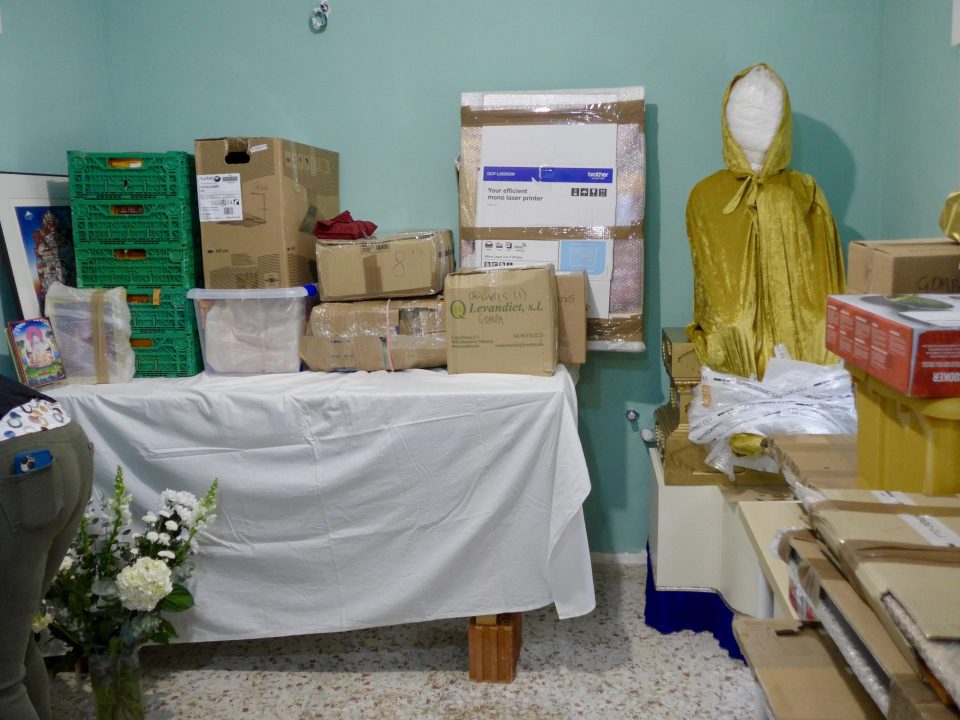
The altar right after the move, 2025. Photo courtesy of Tekchen Choeling.
Geshe Lamsang, resident teacher in Nagarjuna Valencia and one of the most acclaimed geshes of the FPMT organization, gave the precise guidelines and recommendations for the ceremony. We neatly followed suit.
As I was descending down the stairs, these stairs I’ve seen since I was born, carrying the box with the statues, I felt for a moment as if hundreds of people were next to me watching. You know? Like when a row of smiley Tibetans cheer you up by the path when you do a pilgrimage with a lama. But way more intense. Skies filled with deities. Only for a brief moment, but I felt it. It was real.
And with the same order—incense first, His Holiness, Lama Yeshe and Lama Zopa Rinpoche…—they arrived at their new location. They had to traverse 300sqm of a construction site to get there, though.
Tekchen Choeling’s new center is far from finished. When Rinpoche gave us the green light to relocate, we scanned the real estate in Ontinyent for suitable options. It took us until November of that year to find a place that met all of the requirements—a large, light-filled commercial premise in a good area of town, and for a good price. This one came with a big plus: a backyard orchard with fruit trees and an ancient farmhouse—in the middle of town! Surrounded by buildings. It is surreal.
The center bought the property in January of 2024. Permits, paperwork, unexpected structural fixes in the building, and delays with the architects took around a year and a half. Now, the property is ready for renovation, with the gompa as the main priority. However, the garden countryside house is only accessible through the commercial premise, so renovating it in the future would compromise the venue—it had to be renovated before. So rather than waiting, our team renovated the “casita” themselves in an astonishing volunteer effort, with their own hands, skills, and money.
Incense leading the way, His Holiness first, Lama Yeshe and Lama Zopa Rinpoche following…
The ceremonial procession traversed the not-yet-renovated property all the way to the back, down the stairs to the garden, and into the little farmhouse, to find another dozen people—our friends and sangha—reciting the Sutra of the Accumulation of Auspiciousness, with a very auspicious surprise: Ven. Jesús Revert Champa Shempen was there. Venerable Jesús is an Ontinyent-born Geshe—the only Spanish geshe as far as we know—who spends nine months a year in retreat and only occasionally visits centers in Spain.
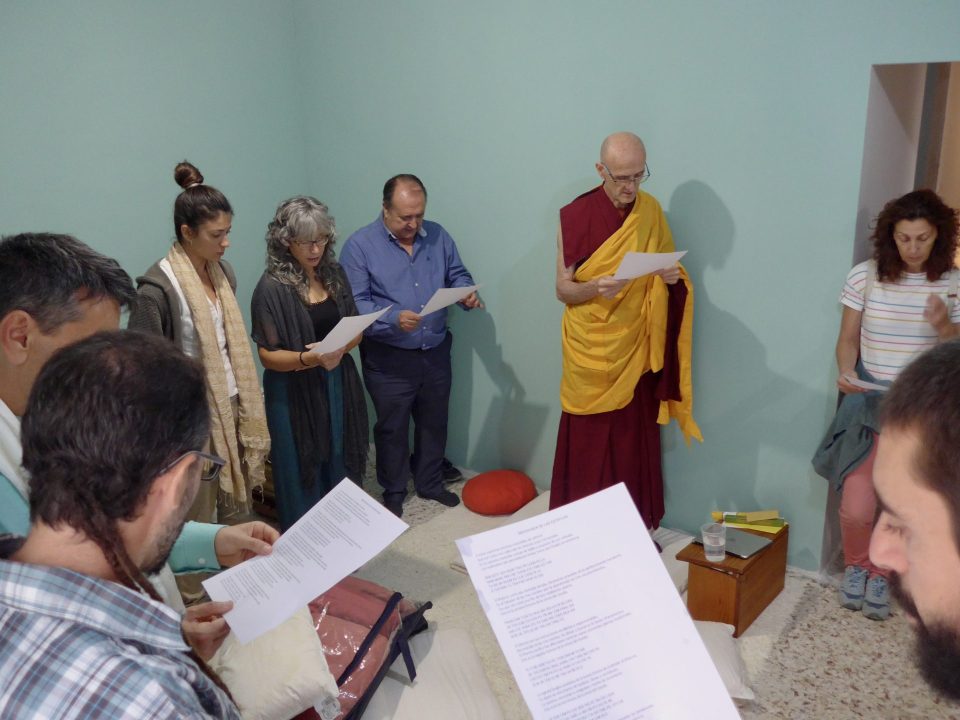
Venerable Jesús and center members recite for the moving ceremony, 2025..Photo courtesy of Tekchen Choeling.
With the revered monk as witness, a dozen people charged into the room with incense, portraits, and box after box of holy objects, including the complete Kangyur texts in fruit boxes, into a room that was already crammed to the limit. This room, it turns out, will only be the kitchenette of the “casita.” For now, though, it has become a temporary gompa stacked with wrapped holy objects until the renovation of the main part of the property is completed.
And why move from a small gompa to an even smaller one? Need. Tekchen Choeling has had to sell the apartment to start payments to the construction firm and begin the renovation. The precipitous relocation is only one of many inconveniences that Tekchen Choeling has faced to move this project forward. A major step for a small center, the renovation is pushing us all to the limits.
Director Paloma Belda confesses having many sleepless nights over worries that they might not finish it. “I would have never chosen this for myself,” she half-jokes. “But it’s my duty. For the center. For the town. For all sentient beings.”
They were left with no alternative. As Chelo, another long-term member of the center, explains, “there was no other way. In two or three years, I won’t be able to climb these stairs. And it’s the same for half the board. And half our teachers. It was either moving or closing down.” (Please watch a short video of video of their Maitreya Buddha statue being transported down the stairs on a wheelchair!)
Despite the major uphill they face financially, the mood is bright as sunlight, and confidence is high as the sky. “Everyone supports us,” says Paloma. “Every teacher, every neighbor, every FPMT center… They all see what we are doing and are left amazed. Especially if they can see the benefit this will bring to the world. We are expanding our guru’s mandala. That’s it. That’s our job.”
Next year, the center will turn 40. For our 40th anniversary, we plan to finish the renovation just in time for an inauguration Mahayana party, complete with teachings, community building, and social impact activities. We will have to move our altar again—but now, at least, we already know how. And so do you.
Kelsang Bas is a writer and social entrepreneur from Spain. Born into an FPMT family—his parents founded the Tekchen Choeling center in Ontinyent—he now helps small centers innovate and grow despite today’s challenges. He is assistant director at Tekchen Choeling.
Please watch an inspiring video Tekchen Choeling has put together on this move and how to get involved:
With grateful thanks to Kelsang for this story. We welcome the submission of news stories from those within the FPMT community. This can be a story about something you have personally completed or accomplished, about someone else who has done so, or about the FPMT center, project, or service of which you are a part. Ideal submissions will give readers reasons to rejoice, share ideas, and create connections between those in the international community. Have something to share? Please let us know!
Foundation for the Preservation of Mahayana Tradition (FPMT), is a Tibetan Buddhist organization dedicated to the transmission of the Mahayana Buddhist tradition and values worldwide through teaching, meditation and community service.
- Tagged: spain, Tekchen Choeling
14
Festival of Tibet at Istituto Lama Tzong Khapa
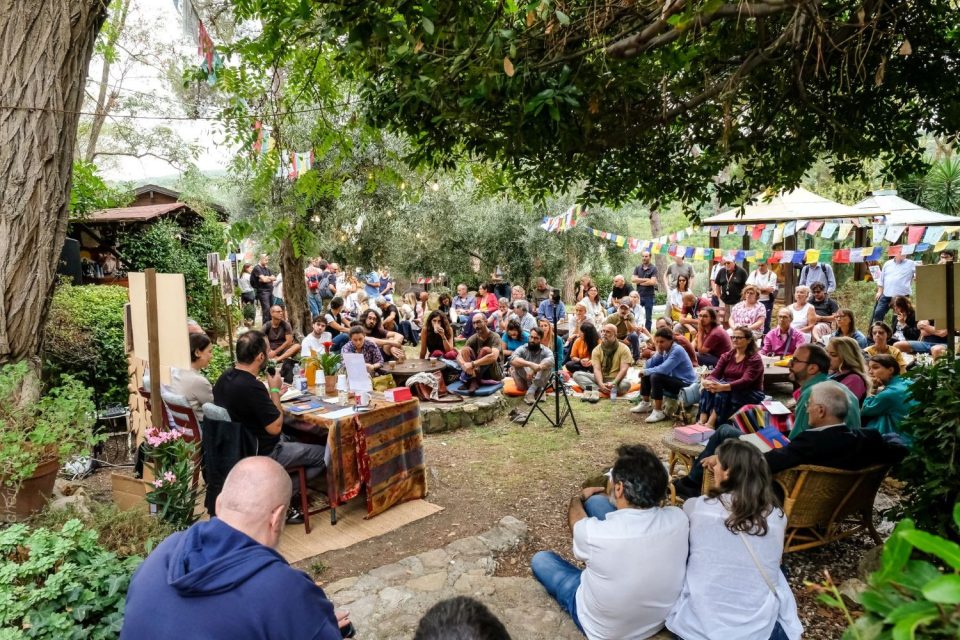
Presentation of books by His Holiness the Dalai Lama and Thich Nhat Hahn at the Festival of Tibet at ILTK.
From September 12-14, 2025, Istituto Lama Tzong Khapa (ILTK), Italy, hosted the fifth edition of Festival of Tibet in Pomaia with thousands of participants benefiting from the event. The Tibetan community in Italy was brought together for a weekend of several Dharma teachings, book presentations, Dharma art activities for children, and Tibetan street food. Carlota Pinheiro and Fabiana Lotito share the story:
Love, Compassion, and Dharma
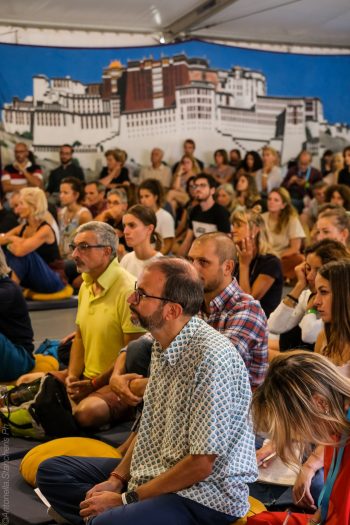
Participants during teachings at the Festival of Tibet at Istituto Lama Tzongkhapa, Pomaia, Italy, September 2025.
We have received nothing but kindness and generosity from the Tibetan people, despite their unimaginable suffering over decades. Though their homes, monasteries, and material heritage have been destroyed, what they strive most to preserve—and what they offer us with open hearts—are the teachings of love and compassion, the precious Dharma itself.
As Dharma practitioners and global citizens, we have much to learn from this resilience. While our world seems to destroy itself more each day, the Tibetan community shows us the way where wisdom and compassion are the true inheritance we pass to future generations.
This festival honored not just Tibetan culture, but the extraordinary capacity of the human heart to transform suffering into wisdom, loss into generosity, and exile into a gift for all humanity.
A Letter from His Holiness the Dalai Lama
His Holiness the Dalai Lama kindly wrote a letter addressed to ILTK on the occasion of the festival, noting how our programs would offer participants “a greater understanding of our rich Tibetan Buddhist cultural heritage” and emphasizing that this “culture of peace and compassion” has “great potential to contribute to the betterment of humanity in general.” His words reminded us that wherever we find ourselves, when we can be “cordial and compassionate, we will live meaningful lives doing what we can for the good of society.” We encourage you to read the letter from His Holiness in full.
Celebrating Tibetan Heritage: A Weekend of Dharma, Culture, and Community
The festival was inaugurated with a Lama Chopa puja, followed by the streaming of the wonderful movie “Never Forget Tibet: The Dalai Lama’s Untold Story”, the deeply personal account of the 14th Dalai Lama’s escape from Tibet in 1959. Watching the journey of His Holiness through the most difficult hardships and fears on those mountains, brings us face to face with an extraordinary act of preservation—not just of a single life, but of an entire civilization, a profound spiritual heritage.
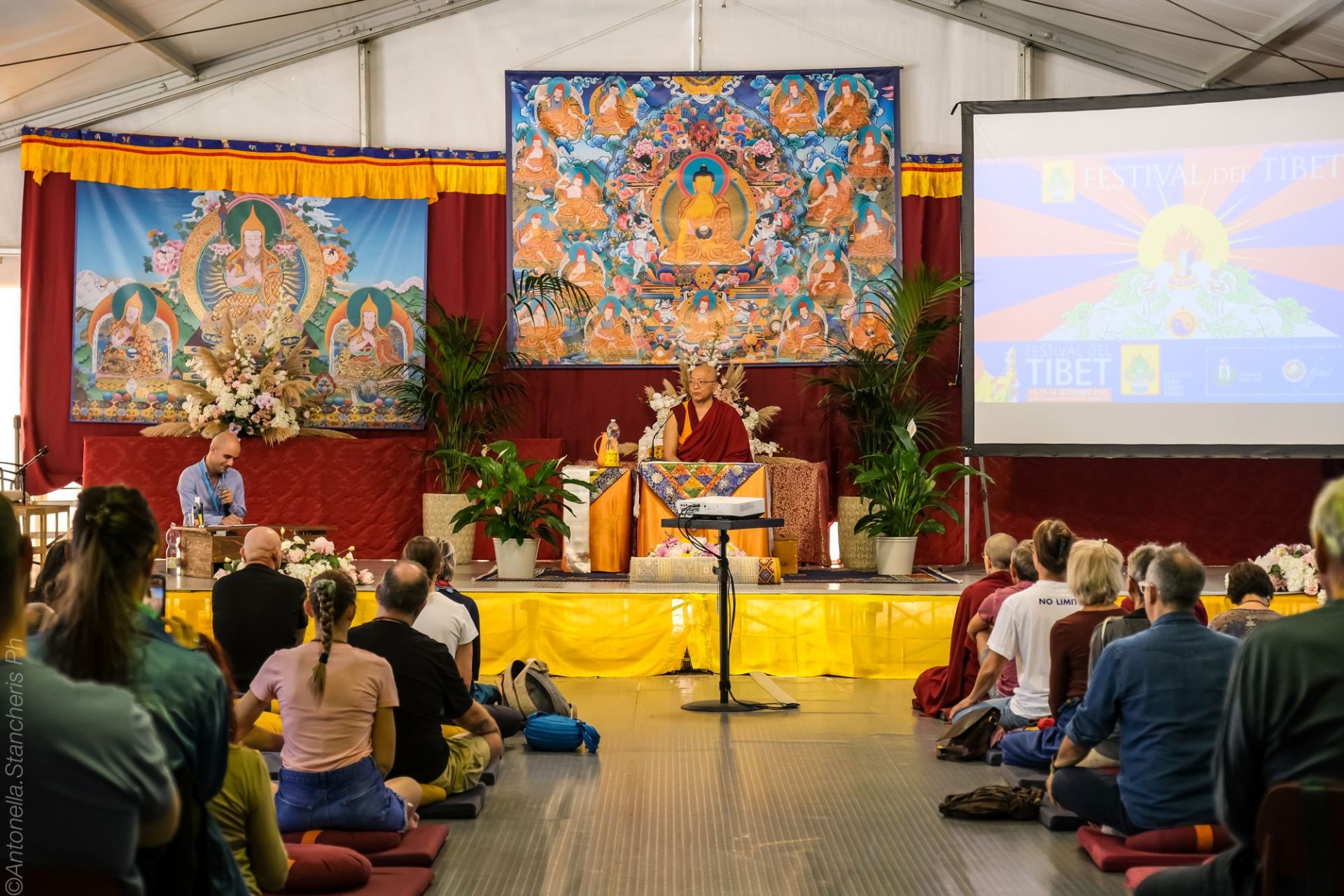
Geshe Tenzin Thenpel, resident teacher of ILTK, offering teachings during the Festival of Tibet at ILTK, Italy, September 2025. Photo by Antonella Stancheris.
Millenia of Wisdom: Teachings and Books
As the sun rose on Saturday, September 13, it was time for the precious teachings of Geshe Jampa Gelek and Geshe Tezin Tenphel, our two resident teachers at ILTK, the teachers of the FPMT Masters Program and FPMT Basic Program, respectively, as well as weekend monthly retreats. The topic, acknowledging the Year of Compassion as a year-long celebration of the life of His Holiness the Dalai Lama, was on compassion and how this practice can help humanity and be our direct path to lasting happiness.
On the morning of Sunday, October 14, we were gifted with more teachings on the same topic for the new visitors, blessing the festival with wisdom and genuine laughs. The afternoons were enriched by the guided meditations of Ven. Sonam Wangchuk.
On both afternoons, we gathered in the Tea Garden for the presentation of two books: Following in the Buddha’s Footsteps: Refuge, Ethical Conduct, Calm‑Abiding, and Insight Meditation, by His Holiness the 14th Dalai Lama and Ven. Thubten Chodron, and Il Nocciolo Della Vacuità by Thich Nhat Hanh, a recent Italian publication based on his teachings on selections from Nagarjuna’s Stanzas on the Middle Way (which has not been published in English).
Both books have been made available in Italian by Nalanda Edizione, publisher of FPMT Italy, and Ubiliber, The Italian Buddhist Union’s (UBI) publisher, respectively.
In the Tea Garden, we hosted “A Space for the Young,” recognizing the importance of connecting younger generations with Tibetan values. A thoughtful 12-year-old girl interviewed Geshe Thenpel about compassion and how to deal with difficult thoughts and challenging friendships.
Wisdom in Dialogue
On a secular approach, the festival was enriched by two deeply meaningful conferences that brought Buddhist wisdom into conversation with our contemporary world—academic and political. We welcomed five professors from the University of Pisa for a conversation on “Compassion and End of Life in the Tibetan Buddhist Tradition.” Ciro Conversano, Angelo Gemignani, Francesco La Rocca, Bruno Neri, and Ilaria Vaglini explored end-of-life in a spiritual, scientific, and philosophical way that fosters awareness and acceptance.
We also had the privilege of hearing from Senator Andrea De Priamo, President of the Italia-Tibet Parliamentary Intergroup, who opened our hearts with a talk entitled: “Dalai Lama: The Politics of Compassion,” which was a reflection on how His Holiness’s approach to leadership and search for peace—choosing compassion over power—offers us a beautiful vision for how we might govern and relate to one another. This conference had the privilege to welcome Claudio Cardelli, President of Italy-Tibet Association, Ven. Massimo Stordi and, via Zoom, Kungo Thinlay Chukky, Representative of the Dalai Lama in Geneva for Southeastern Europe.
These conversations reminded us that the Dharma doesn’t live only in our meditation practice, but can walk with us through our hospitals, our homes, and even our halls of government, gently teaching us how to care for each other.
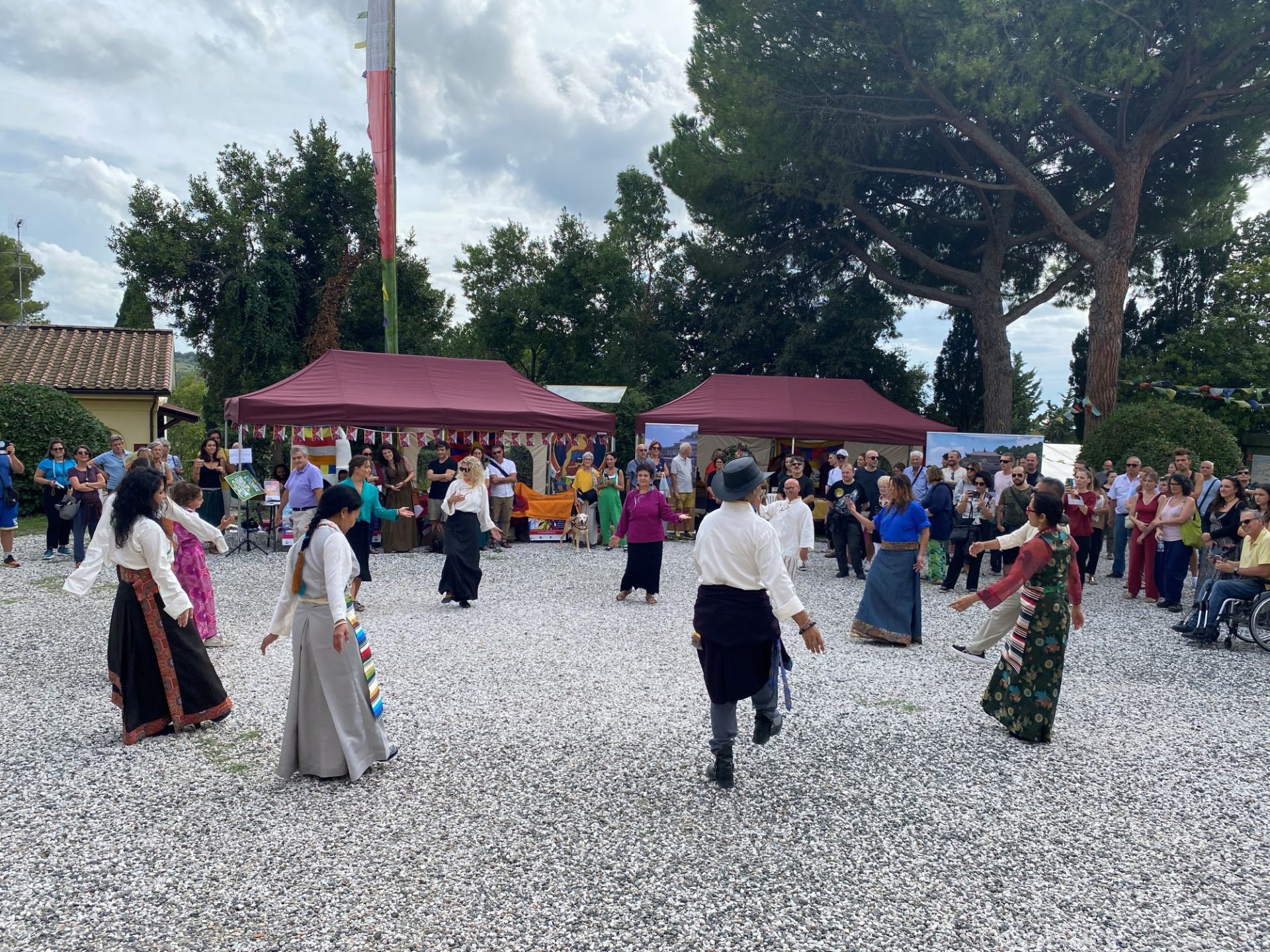
Traditional Tibetan dance being offered at the Festival of Tibet at ILTK. Photo by Antonella Stancheris.
Art as Dharma: Creative Expressions of the Path
The festival came alive with vibrant artistry. Our institute’s dance group, after months of dedicated practice, gathered in a large circle and invited Tibetans to join them in sharing traditional dances, creating a beautiful moment of cultural celebration and community. In the garden, Ani Lucia opened a tsa-tsa workshop, welcoming visitors, parents, and children to learn the sacred art of crafting these small clay offerings—miniature statues that carry prayers and merit. Alongside this, the Dharma Art Academy guided visitors through their first steps in painting a thangka!
Three compelling photo exhibitions enriched the experience: “Ladakh: The Little Tibet of India Monasteries and Buddhist Religious Festivals,” by Antonella Stancheris, “The Life of Siddhartha the Buddha,” by Piero Sirianni, and “Dalai Lama: 90 Years of Compassion,” by the Tibetan Community in Italy, which traced His Holiness’s remarkable journey meeting with great leaders around the world. Together, these activities invited everyone as participants in Tibet’s living traditions.
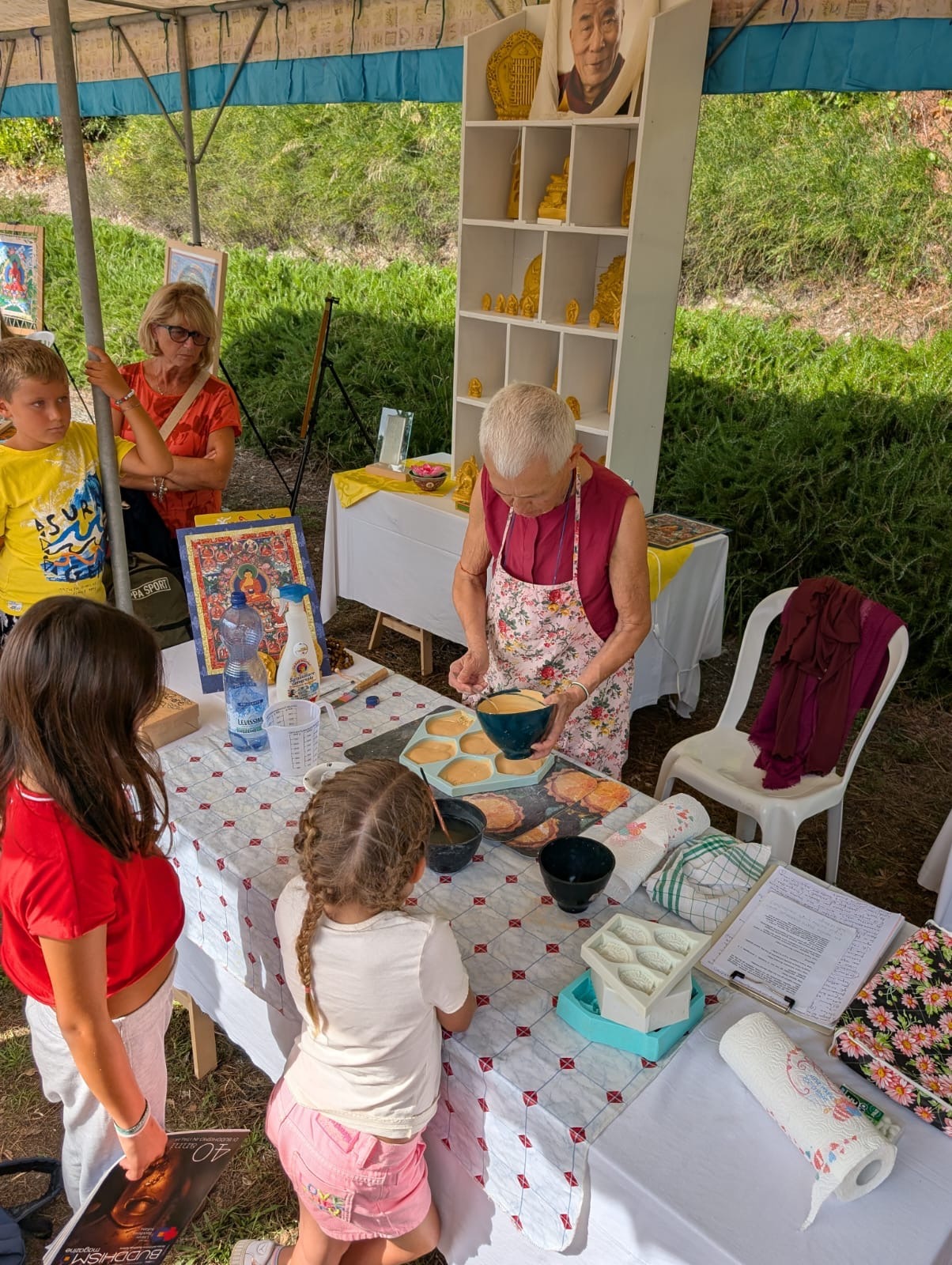
Ani Lucia at the tsa-tsa making booth at ILTK’s Festival of Tibet. Photo by Antonella Stancheris.
Opening Hearts, Opening Doors
One of the most beautiful aspects of our Tibet Festival was witnessing how many people stepped through our doors for the very first time to encounter Dharma and Tibetan culture. The informal atmosphere created perfect conditions for meaningful encounters, with mantra concerts in the tea garden and stands throughout the courtyard offering diverse ways to connect: sessions on Tibetan Medicine and Yoga, members of the Tibetan community in Italy welcoming visitors, and the Italian association “Dare Protezione” (Giving Protection) offering one-on-one dialogues and support about the death process for oneself and loved ones.
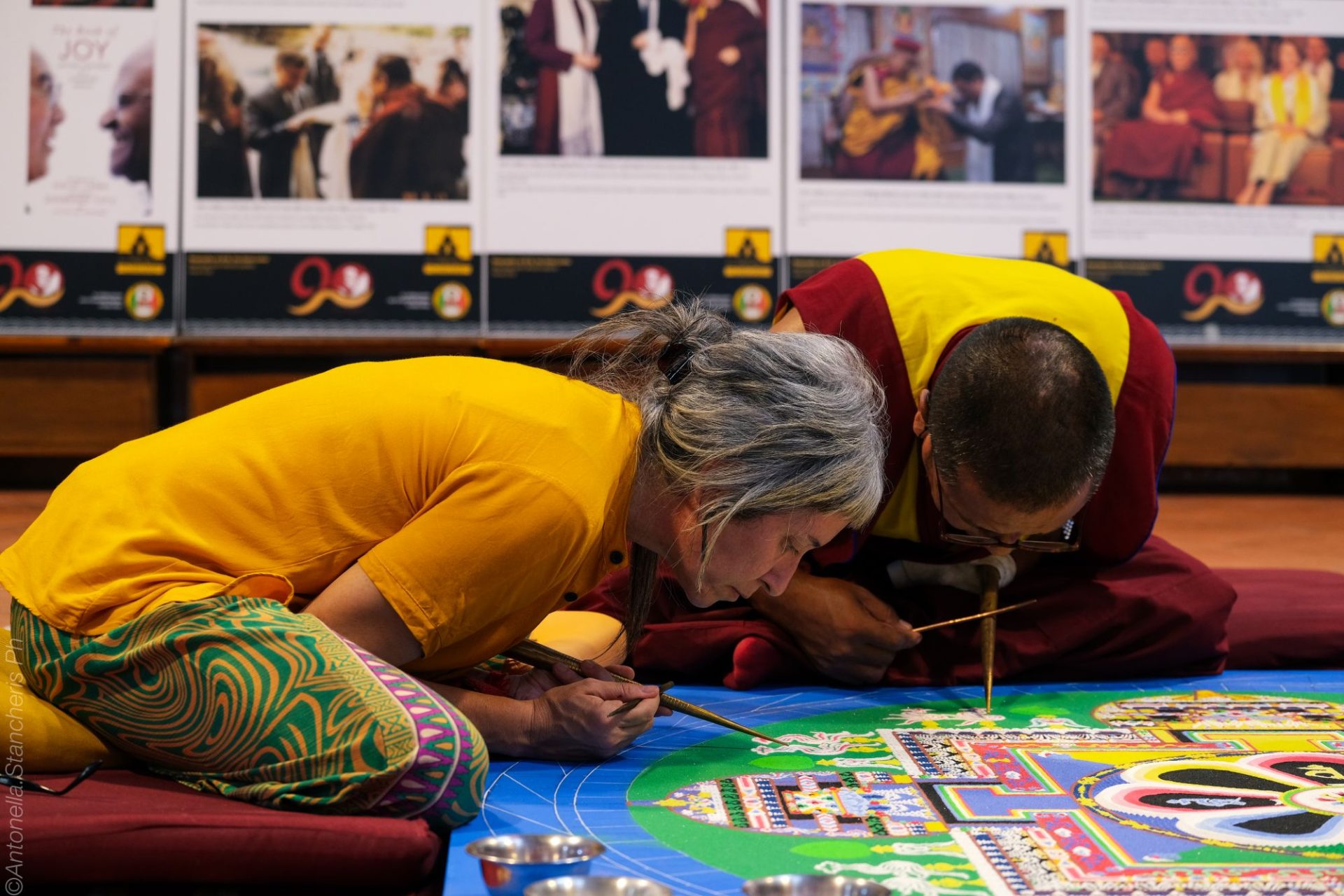
The creation of the sand mandala of Chenrezig for the Festival of Tibet at ILTK. Photo by Antonella Stancheris.
Seeds of Transformation
The festival reached its culmination with the dissolution of the sand mandala of Chenrezig, constructed over a week by Geshe Lhundrup, Elisa Macci, and two geshes from Sera Jey Monastery in India who were invited to help with it’s creation. This extraordinary work—countless hours of meticulous drawing and painting with colored sand while chanting mantras—vanished in mere seconds. Geshe Lhundrup, resident at ILTK, smiled and said “mitagpa!”—impermanence in Tibetan. “So many hours of work and gone in one second!”
Many visitors gathered in the room to witness this powerful moment they will forever carry in their hearts—a living demonstration of the Buddha’s core teaching on impermanence.
As the colored sands were swept away, we dedicated this merit to all those who are not at peace at this moment. We dedicated the merit generated from the whole festival to the end of wars, cultivation of peace, and to the finding of the path to lasting happiness.
With grateful thanks to Carlota Pinheiro & Fabiana Lotito for this story. We welcome the submission of news stories from those within the FPMT community. This can be a story about something you have personally completed or accomplished, about someone else who has done so, or about the FPMT center, project, or service of which you are a part. Ideal submissions will give readers reasons to rejoice, share ideas, and create connections between those in the international community. Have something to share? Please let us know!
Please read another recent story about ILTK’s community events.
Foundation for the Preservation of Mahayana Tradition (FPMT), is a Tibetan Buddhist organization dedicated to the transmission of the Mahayana Buddhist tradition and values worldwide through teaching, meditation and community service.
7
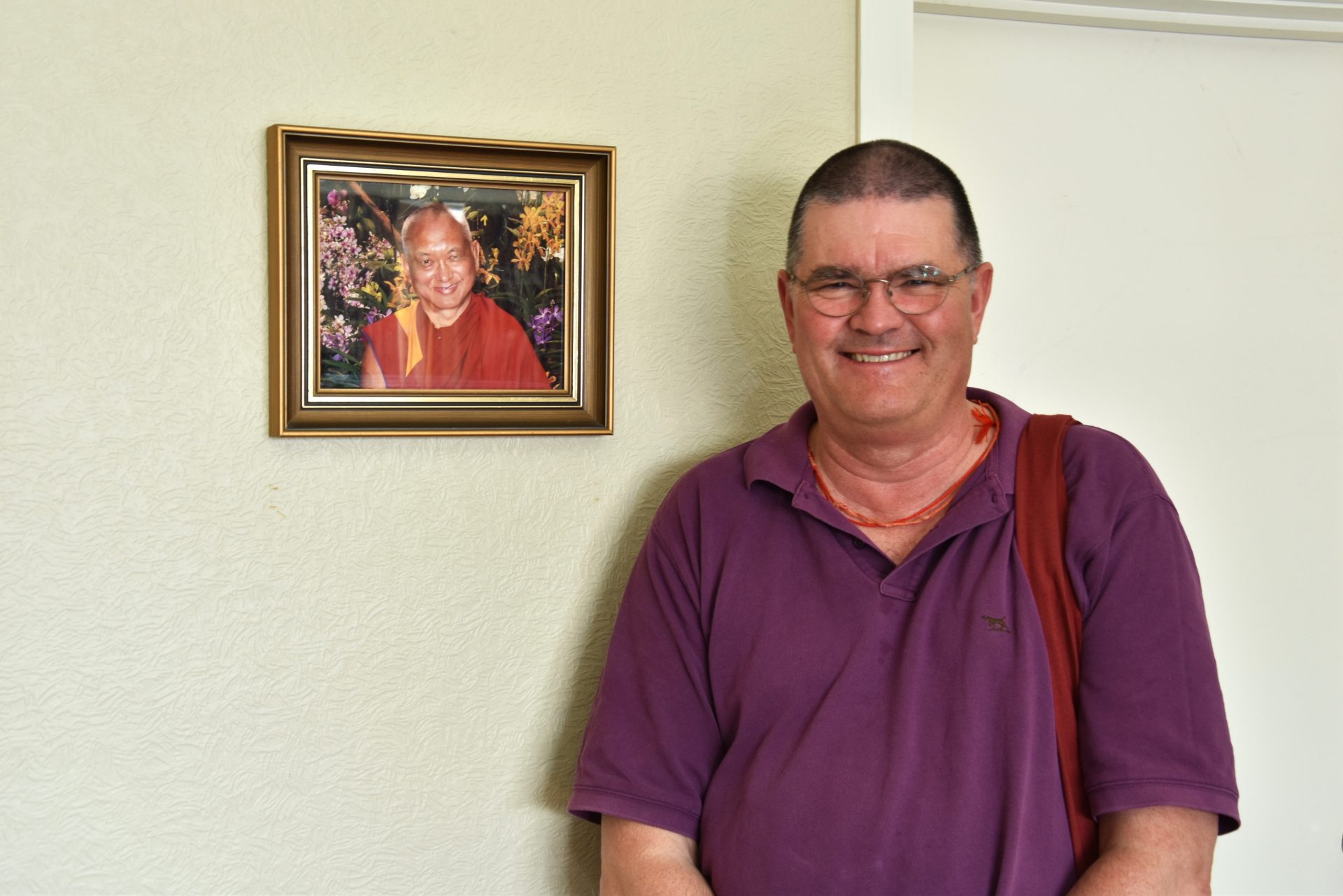
Brian Rae at Dorje Chang Institute, New Zealand, at end of year potluck lunch, December 13, 2020.
Brian Rae passed away suddenly of a heart attack on September 12, 2025 in Taupo, New Zealand.
The following words celebrating Brian’s qualities, interests, and years of service in the FPMT mandala were prepared by Simon Harrison, a FPMT-registered teacher, with input from Brian’s sister Susan, his wife Paula, and Ven. Gyalten Wangmo, the spiritual program coordinator of Dorje Chang Institute.
Brian can be best summed up with 3Hs: hats, hugs, and happiness. He was a big-hearted, big-chested, big-smiling man, for whom nothing was too much trouble. He filled many roles around Dharma centers in New Zealand. He served on the board of Mahamudra Centre and was a trustee of Dorje Chang Institute from 2021 until he passed away on Friday, September 12, 2025, with no warning signs, shortly after completing his morning prayers.
Brian first connected with Dorje Chang Institute (DCI) around 2009, when His Holiness the Dalai Lama visited New Zealand and has been a constant support for both DCI and Mahamudra Centre ever since.
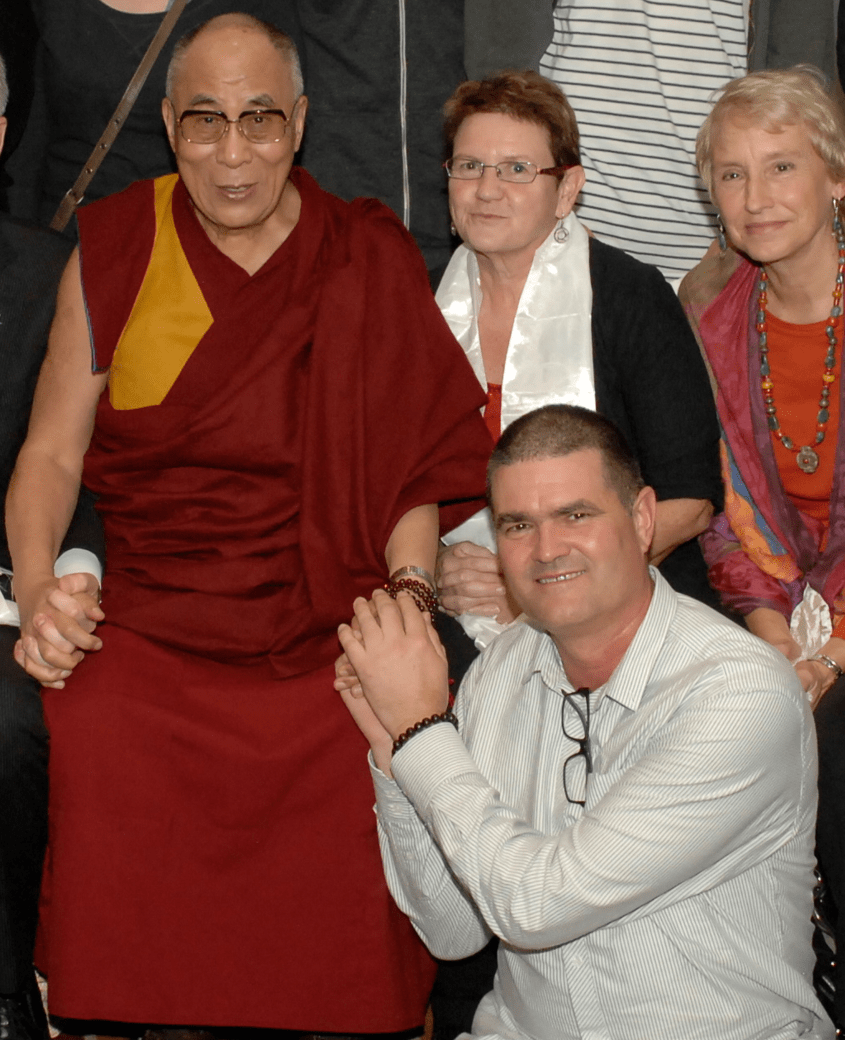
Brian Rae with His Holiness the Dalai Lama, New Zealand, 2013.
He took on the role of national coordinator for FPMT New Zealand in 2014 to coordinate the visit by Kyabje Lama Zopa Rinpoche the following year. He continued in the role until after His Eminence Ling Rinpoche visited in 2020, after which Covid kept us all in our own little bubbles.
Brian loved his family: his wife Paula; three daughters, Ella, Lucy (husband Jake) and Georgia (husband Oliver); and three grandchildren, Luca, Fleur and Leah. There were many times the family would gather with Brian at the heart of it, building Legos with the kids and regaling the rest with extensive stories of the latest “new” thing. He and Paula had just completed building their retirement retreat overlooking Lake Taupo, close to the grandchildren, when he was so suddenly taken from us.
His Dharma journey was infectious. Joined by his sister, Susan, together they would appear for teachings or to offer service at Mahamudra Centre or Dorje Chang Institute. Always humble, his passion for the centers and his devotion to his teacher defined him.
At DCI, he recently oversaw the refurbishment of the stupa. He expressed his love of trees as groundsman supervisor. His memory stays with us in the trees and other greenery around the property, as well as being the star of the training videos for groundskeeping equipment.
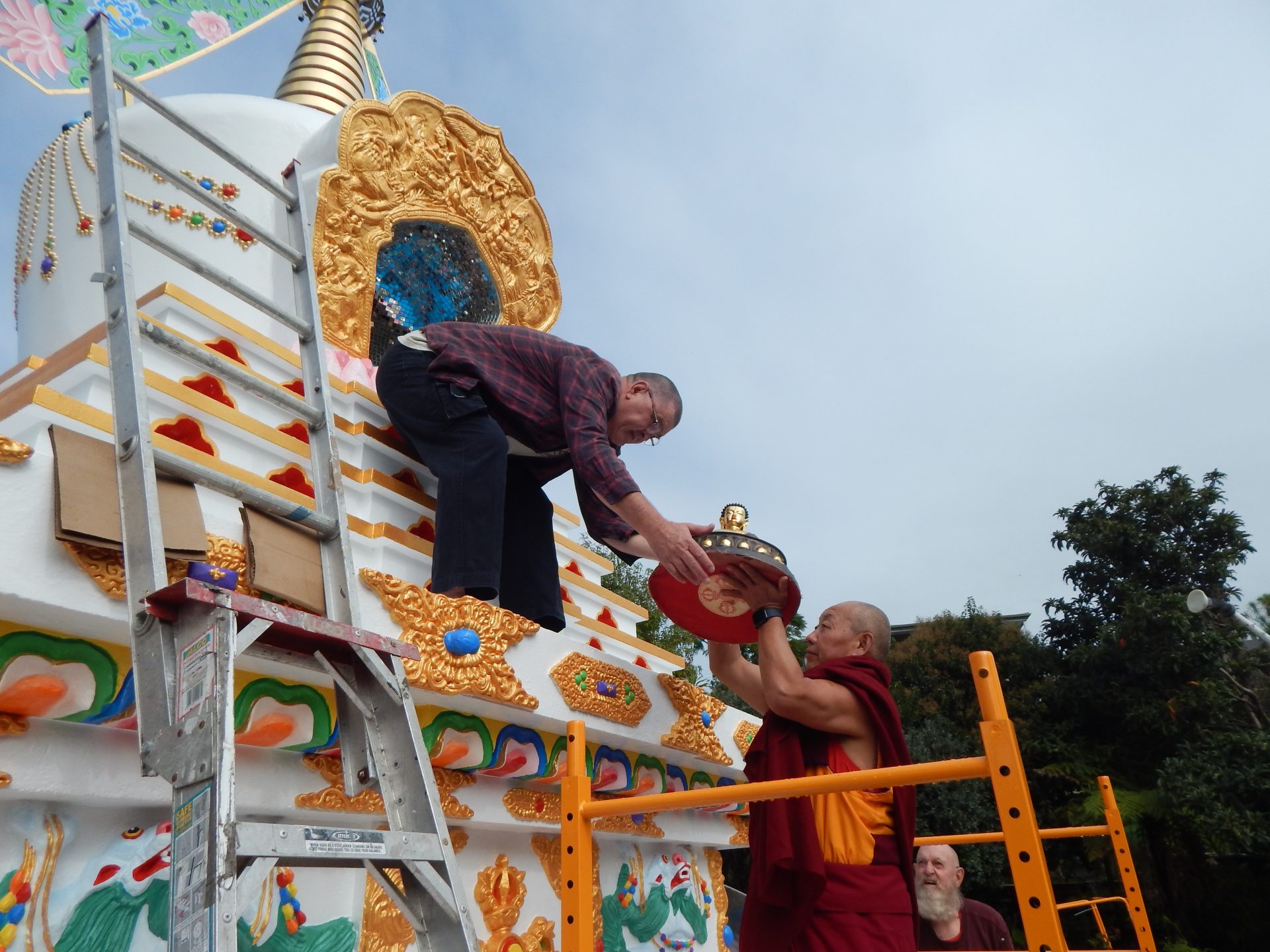
DCI Stupa Refurbishment Project, with Brian Rae assisting Geshe Wangchen, April 6, 2024.
While managing the house build, fulfilling a demanding job with Auckland Airport, sharing his loves for family and trees, and serving on DCI’s board, Brian managed to complete a full round of the FPMT Basic Program with Geshe Thupten Wangchen at DCI.
His final lesson to us all is the fragility and impermanence of this precious rebirth, and the manner of making it happy and useful.
We pray that all of his merit through service, study, practice, and warm-heartedness will serve him well into the future up to his enlightenment.
Please pray that Brian may never ever be reborn in the lower realms, may he be immediately born in a pure land where he can be enlightened or to receive a perfect human body, meet the Mahayana teachings and meet a perfectly qualified guru and by only pleasing the guru’s mind, achieve enlightenment as quickly as possible. More advice from Lama Zopa Rinpoche on death and dying is available, see Death and Dying: Practices and Resources (fpmt.org/death/).
To read more obituaries from the international FPMT mandala, and to find information on submission guidelines, please visit our new Obituaries page (fpmt.org/media/obituaries/).
- Tagged: obituaries, obituary
3
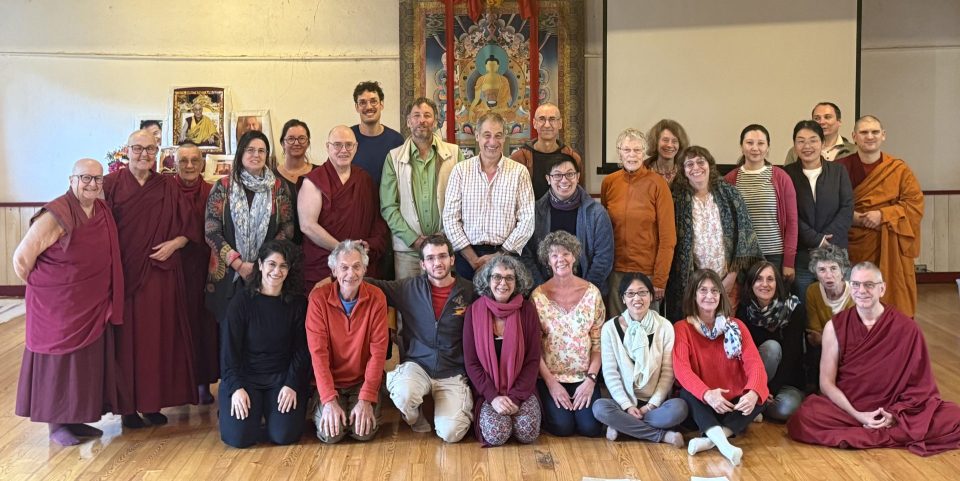
Foundation Service Seminar participants at IVY, France, September. Photo by Capucine Reddon.
FPMT International Office staffer Zarina Osmonalieva attended her fist Foundation Service Seminar at Institut Vajra Yogini in France this September. Here she shares her experience joining this FPMT immersion retreat.
Led by Francois Lecointre and Wendy Ridley, the latest Foundation Service Seminar was held at Institut Vajra Yogini, France (IVY), from September 24-28, 2025. Around 40 participants from different FPMT affiliates from Europe joined. We had the pleasure of sharing the FSS with Sangha members and a new team of volunteers and directors, Venerable Tendar and Christophe Rotiel, of Vajrayogini Institute. What a great start it must be for them, I thought, as FSS with its rich content about the history and values of FPMT, teachings of lamas, Vast Visions for the next thousand years set out by Lama Zopa Rinpoche could be a great boost of energy and motivation!
Many conditions made this FSS a harmonious and safe space to learn about the culture and significance of service within FPMT. Vajrayogini Institute’s team of volunteers offered their best to make everyone feel welcomed and comfortable and nourished by tasty meals. Wendy and Francois, with their many years of service as center directors and FSS trainers, skillfully facilitated the process of internalizing the values and learning the ways of serving at centers and study groups and igniting the “family feeling.”
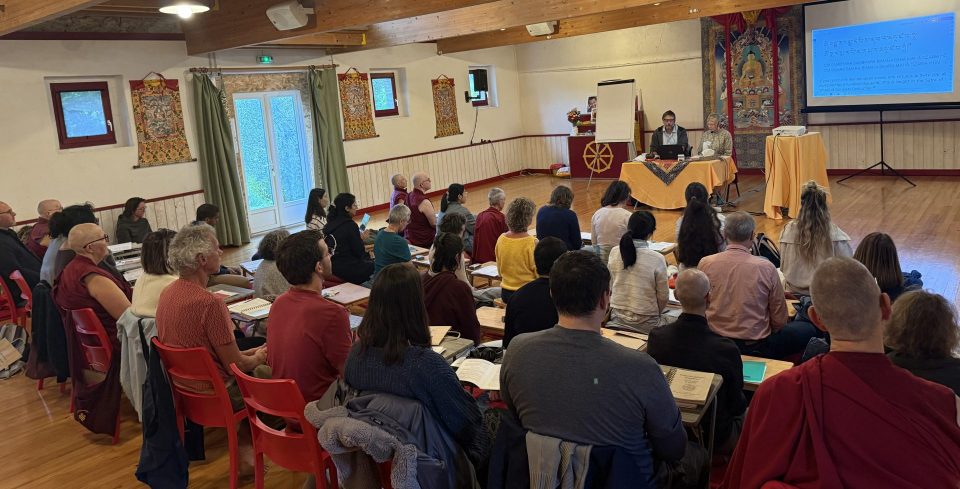
FSS facilitators, Francois Lecointre and Wendy Ridley, leading a session at IVY. Photo by Capucine Reddon.
The format of FSS reminded me of the creative methods used in the 16 Guidelines workshops, where group exercises and playful activities do some magic – they open hearts to new encounters and friendships and allow space for collective wisdom to emerge. I am sure we all made meaningful connections and found new friends!
All participants were gifted a set of Inner Job Description cards, a tool that helps developing mindfulness of our thoughts, speech, and actions. A few participants mentioned they would be happy to use them in their services at centers. One participant shared, “Lots of aspects (of IJD) are practical and I will put them into practice personally.”
One very important message that we were all reminded of was that when offering Dharma service, we do not focus on the outcome only, but on how we do things. We also discussed how understanding our dependence on each other guides us in doing things in a more holistic and sustainable way.
My personal takeaway from FSS this time would be the importance of how we offer service versus getting things done. Very often we may focus on our to-do lists more than creating spaces for spiritual maturation. We may ignore the needs of others because we are busy ticking off completed tasks, or we may ignore our own needs for reflection and rejuvenation and forget that rest and joy are also important ingredients of success.
As Acharya Shantideva says: “The supports when working for the sake of living beings are aspiration, steadfastness, joy and rest.”
We all left IVY feeling immense gratitude and joy. As one of the participants said, “Thank you very much for your tireless preparation and presentation. Thank you also to all those work so hard for FPMT providing resources, archiving teachings, fundraising, but above all, practicing sincerely the Dharma and Wisdom Culture.”
I felt that FSS is not limited to the service within FPMT, it is about cultivating the mindset of offering our best to our family members, friends, and the world at large.
Zarina Osmonalieva worked for Yeshin Norbu Center in Stockholm, Sweden, between 2018 and 2023, first as social media person, then as SPC. Zarina joined the team at FPMT International Office in 2023 and offers service across several departments, including the FPMT Foundation Store, which she manages.
A Foundation Service Seminar is scheduled at Istituto Lama Tsong Khapa, Italy, June 10-14, 2026.
Foundation for the Preservation of Mahayana Tradition (FPMT), is a Tibetan Buddhist organization dedicated to the transmission of the Mahayana Buddhist tradition and values worldwide through teaching, meditation and community service.
- Tagged: foundation service seminar, FSS
- Home
- News/Media
- Study & Practice
- About FPMT Education Services
- Latest News
- Programs
- New to Buddhism?
- Buddhist Mind Science: Activating Your Potential
- Heart Advice for Death and Dying
- Discovering Buddhism
- Living in the Path
- Exploring Buddhism
- FPMT Basic Program
- FPMT Masters Program
- FPMT In-Depth Meditation Training
- Maitripa College
- Lotsawa Rinchen Zangpo Translator Program
- Universal Education for Compassion & Wisdom
- Online Learning Center
- Prayers & Practice Materials
- Overview of Prayers & Practices
- Full Catalogue of Prayers & Practice Materials
- Explore Popular Topics
- Benefiting Animals
- Chenrezig Resources
- Death & Dying Resources
- Lama Chopa (Guru Puja)
- Lama Zopa Rinpoche: Compendium of Precious Instructions
- Lama Zopa Rinpoche: Life Practice Advice
- Lama Zopa Rinpoche Practice Series
- Lamrim Resources
- Mantras
- Prayer Book Updates
- Purification Practices
- Sutras
- Thought Transformation (Lojong)
- Audio Materials
- Dharma Dates – Tibetan Calendar
- Translation Services
- Publishing Services
- Teachings and Advice
- Find Teachings and Advice
- Lama Zopa Rinpoche Advice Page
- Lama Zopa Rinpoche: Compendium of Precious Instructions
- Lama Zopa Rinpoche Video Teachings
- ༧སྐྱབས་རྗེ་བཟོད་པ་རིན་པོ་ཆེ་མཆོག་ནས་སྩལ་བའི་བཀའ་སློབ་བརྙན་འཕྲིན།
- Podcasts
- Lama Yeshe Wisdom Archive
- Buddhism FAQ
- Dharma for Young People
- Resources on Holy Objects
- Ways to Offer Support
- Centers
- Affiliates Area
- Teachers
- Projects
- Charitable Projects
- Make a Donation
- Applying for Grants
- News about Projects
- Other Projects within FPMT
- Support International Office
- Projects Photo Galleries
- Give Where Most Needed
- FPMT
- Shop
Translate*
*powered by Google TranslateTranslation of pages on fpmt.org is performed by Google Translate, a third party service which FPMT has no control over. The service provides automated computer translations that are only an approximation of the websites' original content. The translations should not be considered exact and only used as a rough guide.Renunciation of samsara is not only the business of monks and nuns. Whoever is seeking liberation or enlightenment needs renunciation of samsara.







